2023年中考英语一轮大单元复习(仁爱版)Unit 1 Topic 1-3 复习课件 (共132张PPT)
文档属性
| 名称 | 2023年中考英语一轮大单元复习(仁爱版)Unit 1 Topic 1-3 复习课件 (共132张PPT) |  | |
| 格式 | pptx | ||
| 文件大小 | 4.2MB | ||
| 资源类型 | 教案 | ||
| 版本资源 | 仁爱科普版 | ||
| 科目 | 英语 | ||
| 更新时间 | 2022-12-30 22:35:37 | ||
图片预览

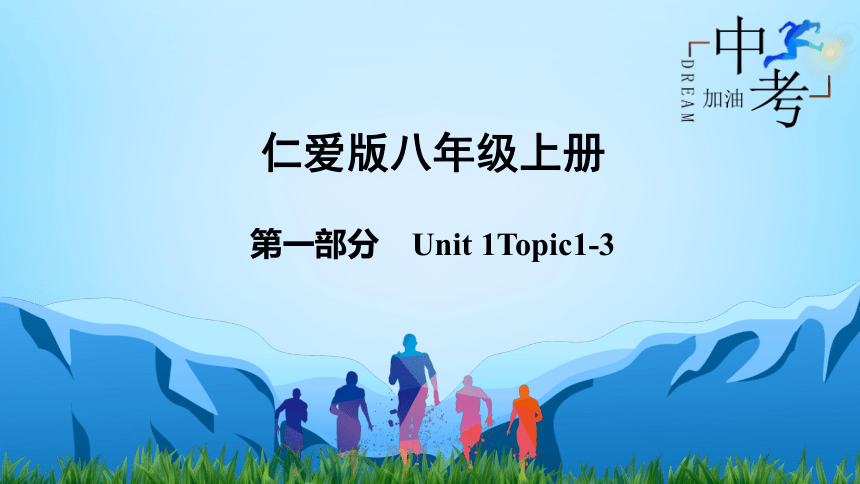
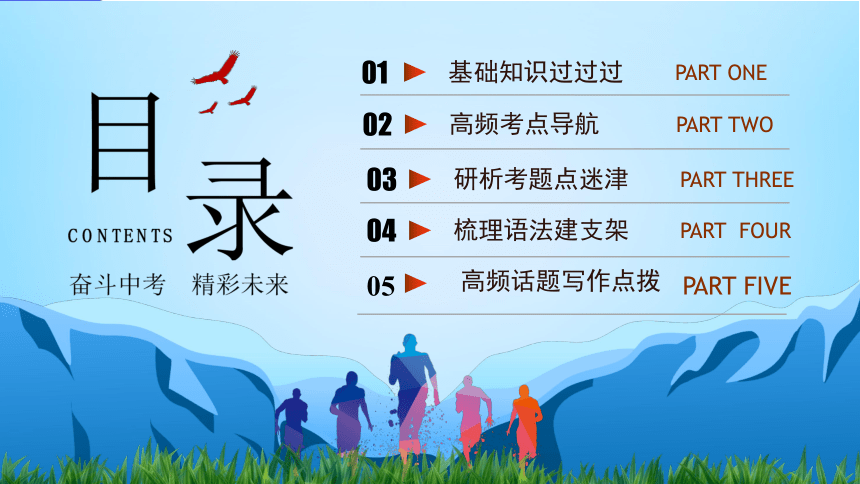
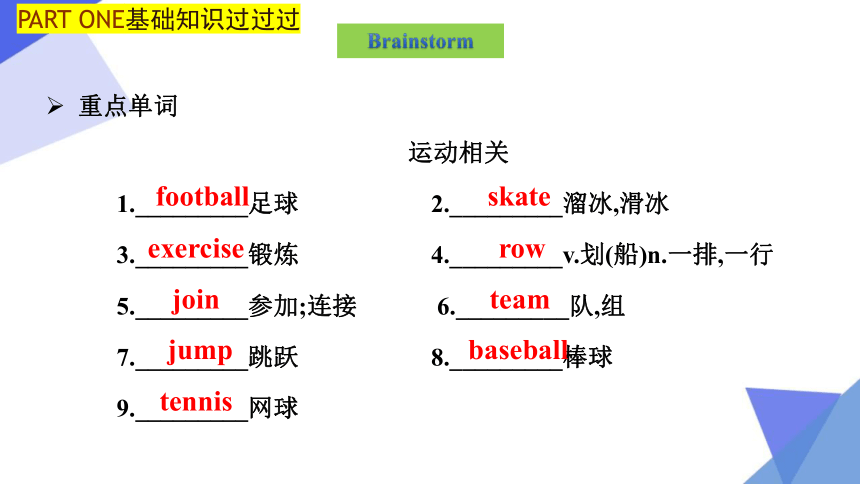
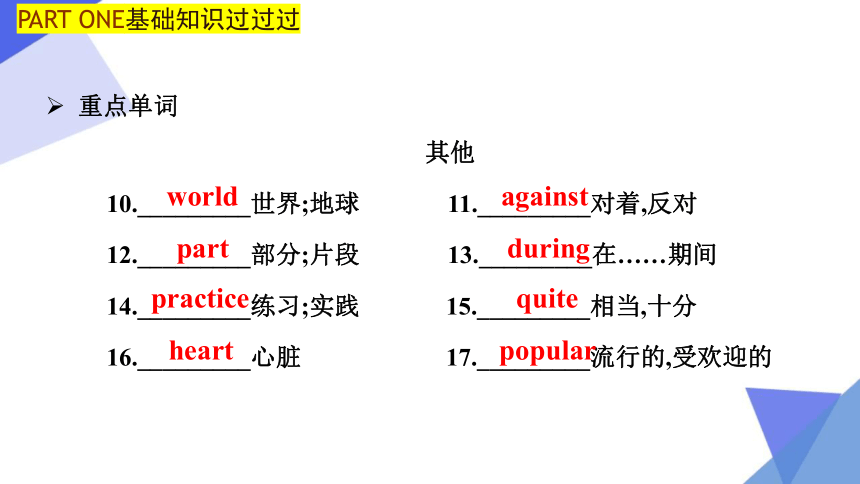
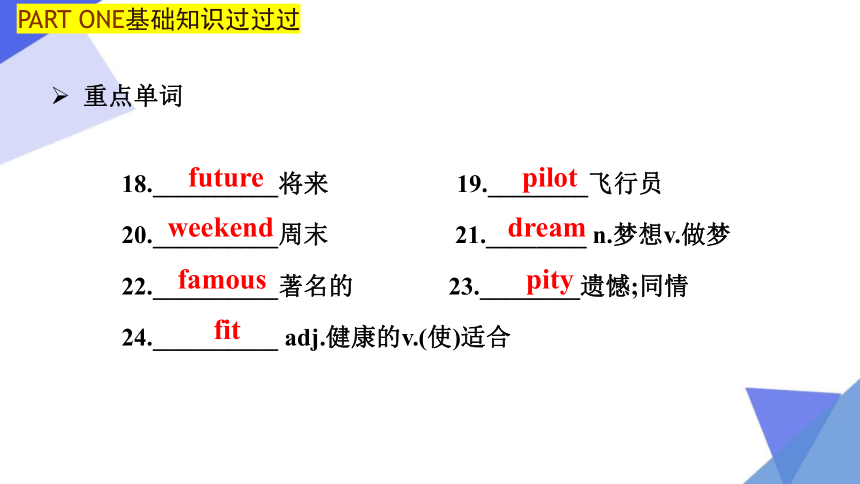
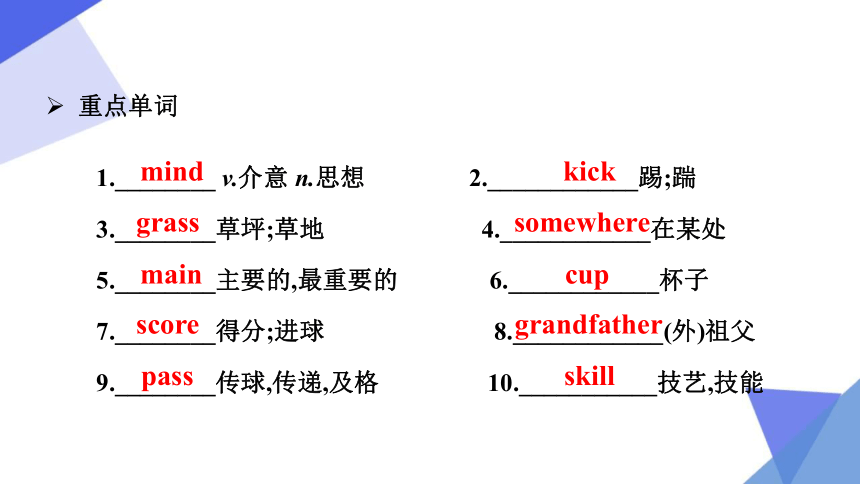
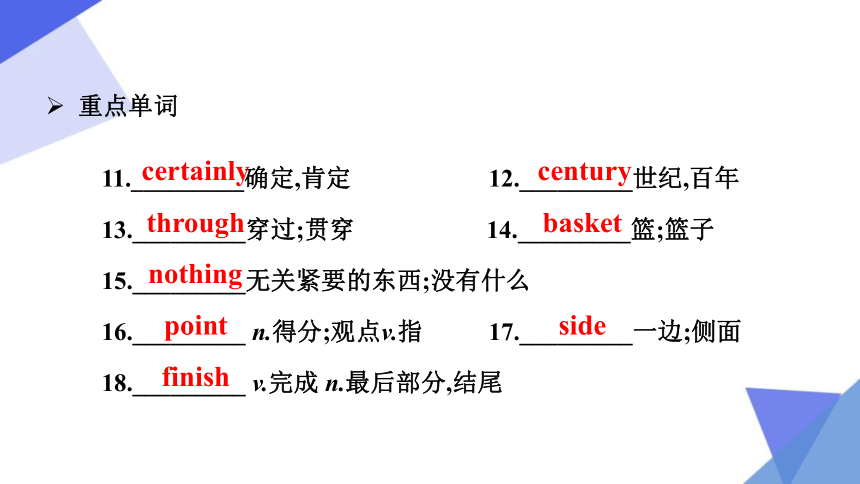
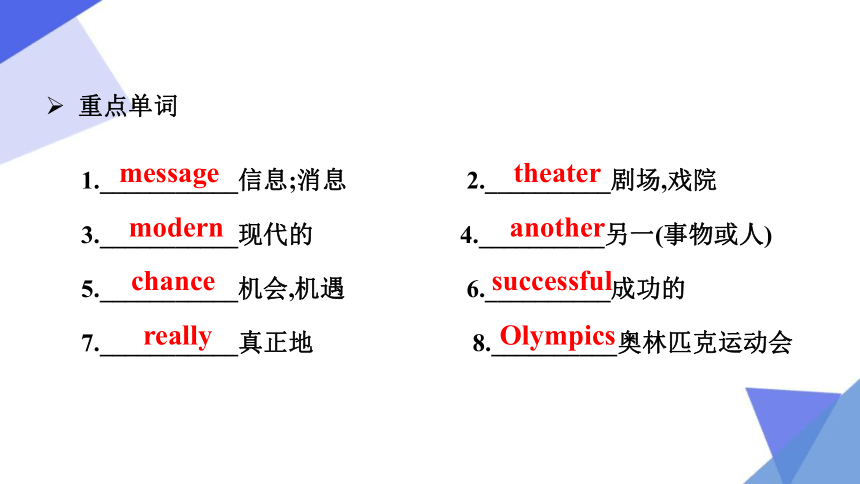
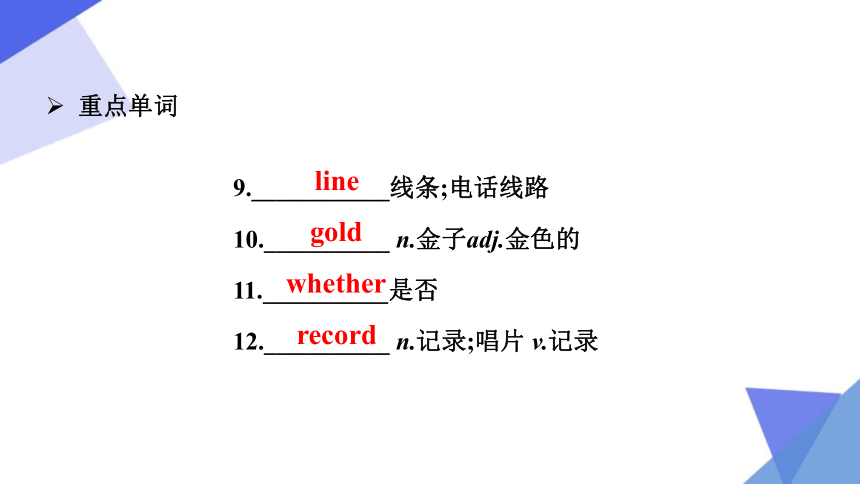
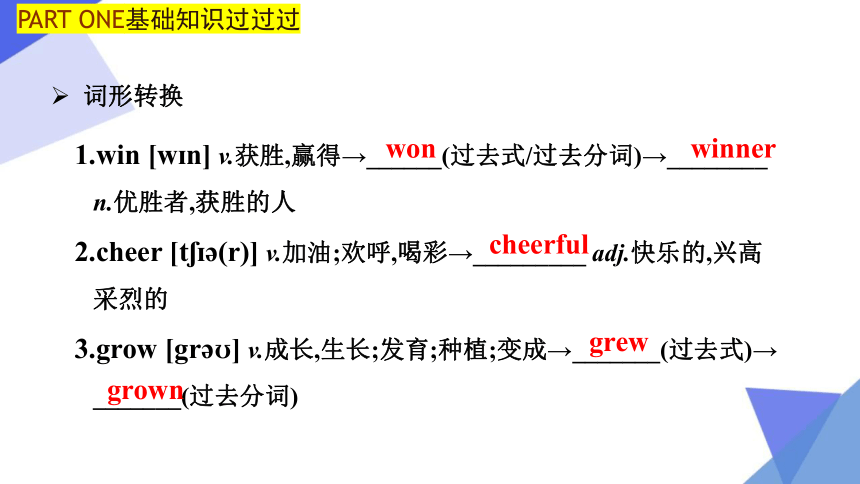
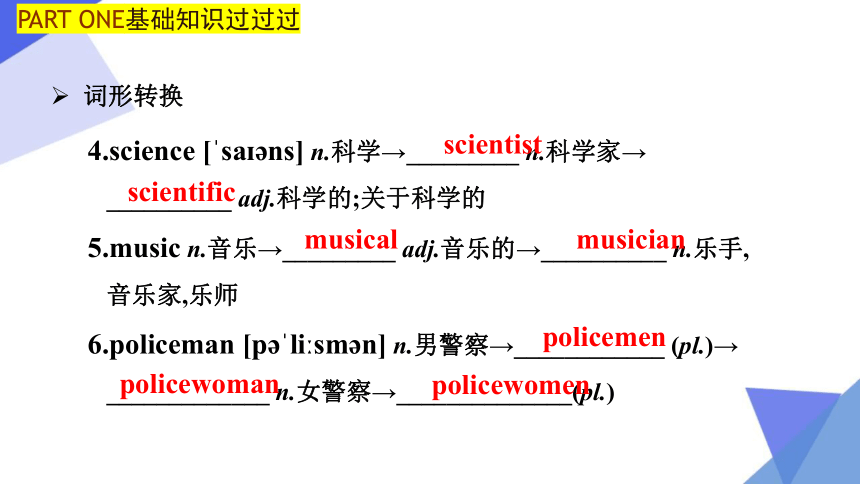
文档简介
(共132张PPT)
2023
英 语
中
考
加油
DREAM
仁爱版八年级上册
第一部分 Unit 1Topic1-3
01
基础知识过过过
PART ONE
02
高频考点导航
PART TWO
03
研析考题点迷津
PART THREE
04
梳理语法建支架
PART FOUR
高频话题写作点拨
05
PART FIVE
运动相关
1._________足球 2._________溜冰,滑冰
3._________锻炼 4._________v.划(船)n.一排,一行
5._________参加;连接 6._________队,组
7._________跳跃 8._________棒球
9._________网球
重点单词
football
skate
exercise
row
join
team
jump
tennis
baseball
PART ONE基础知识过过过
Brainstorm
重点单词
其他
10._________世界;地球 11._________对着,反对
12._________部分;片段 13._________在……期间
14._________练习;实践 15._________相当,十分
16._________心脏 17._________流行的,受欢迎的
world
against
part
during
practice
quite
heart
popular
PART ONE基础知识过过过
重点单词
18.__________将来 19.________飞行员
20.__________周末 21.________ n.梦想v.做梦
22.__________著名的 23.________遗憾;同情
24.__________ adj.健康的v.(使)适合
future
pilot
weekend
dream
famous
pity
fit
PART ONE基础知识过过过
1.________ v.介意 n.思想 2.____________踢;踹
3.________草坪;草地 4.____________在某处
5.________主要的,最重要的 6.____________杯子
7.________得分;进球 8.____________(外)祖父
9.________传球,传递,及格 10.___________技艺,技能
重点单词
mind
kick
grass
somewhere
main
cup
score
pass
grandfather
skill
重点单词
11._________确定,肯定 12._________世纪,百年
13._________穿过;贯穿 14._________篮;篮子
15._________无关紧要的东西;没有什么
16._________ n.得分;观点v.指 17._________一边;侧面
18._________ v.完成 n.最后部分,结尾
certainly
century
through
basket
nothing
point
side
finish
1.___________信息;消息 2.__________剧场,戏院 3.___________现代的 4.__________另一(事物或人)
5.___________机会,机遇 6.__________成功的
7.___________真正地 8.__________奥林匹克运动会
重点单词
message
theater
modern
another
chance
successful
really
Olympics
重点单词
9.___________线条;电话线路
10.__________ n.金子adj.金色的
11.__________是否
12.__________ n.记录;唱片 v.记录
line
gold
whether
record
1.win [w n] v.获胜,赢得→______(过去式/过去分词)→________
n.优胜者,获胜的人
2.cheer [t (r)] v.加油;欢呼,喝彩→_________ adj.快乐的,兴高
采烈的
3.grow [gr ] v.成长,生长;发育;种植;变成→_______(过去式)→
_______(过去分词)
词形转换
won
winner
cheerful
grew
grown
PART ONE基础知识过过过
4.science [ sa ns] n.科学→_________ n.科学家→
__________ adj.科学的;关于科学的
5.music n.音乐→_________ adj.音乐的→__________ n.乐手,
音乐家,乐师
6.policeman [p li sm n] n.男警察→____________ (pl.)→
_____________ n.女警察→______________(pl.)
词形转换
scientist
musical
scientific
musician
policemen
policewoman
policewomen
PART ONE基础知识过过过
7.spend [spend] v.花费(金钱、时间等);度过→_______(过去
式/过去分词)
8.health [helθ] n.健康;保健→________ adj.健康的,健壮的→
_________ adv.健康地
9.relax [r l ks] v.(使)放松,轻松→________ adj.放松的,悠闲
的→_________ adj.令人放松的
词形转换
spent
healthy
healthily
relaxed
relaxing
PART ONE基础知识过过过
10.bad [b d] adj.坏的→_______(比较级)更坏的→_______
(最高级)最坏的
11.leave [li v] v.离开;把……留下,剩下→_____(过去式)
词形转换
worse
worst
left
PART ONE基础知识过过过
1.ill [ l] adj.有病的;不健康的→________ n.疾病
2.main [me n] adj.主要的;最重要的→_________ adv.大体上,
主要地
3.throw [θr ] v.扔,投→_______(过去式)→_______(过去分词)
4.fight [fa t] v.争论;打仗(架)→________(过去式)→_________
(过去分词)
词形转换
illness
mainly
threw
thrown
fought
fought
PART ONE基础知识过过过
5.invent [ n vent] v.发明;创造→__________ n.发明;创造→
_________ n.发明者;创造者
6.become [b k m] v.变得→________(过去式)→________
(过去分词)
7.follow [ f l ] v.跟随→_________ adj.(时间上)接着的,
下述的
词形转换
invention
became
inventor
become
following
PART ONE基础知识过过过
8.hold [h ld] v.抓住,举办;保持→______(过去式)→______
(过去分词)
9.hero [ h r ] n.英雄→________(pl.)
10.hit [h t] v.碰撞→____(过去式)→____(过去分词)→_______
(现在分词)
词形转换
held
held
heroes
hit
hitting
hit
PART ONE基础知识过过过
1.hear [h (r)] v.听见→_______(过去式)→_______(过去
分词)
2.ring v.打电话;(钟、铃等)响→_______(过去式)→_______
(过去分词)
3.stand [st nd] v.站立→_______(过去式)→_______(过去
分词)→__________(熟词新义)
词形转换
heard
heard
rang
rung
stood
stood
位于;忍受
PART ONE基础知识过过过
4.little adv.不多,稍许→______(比较级)→_______(最高级)
5.feel [fi l] v.觉得,感到→_____(过去式)→_____(过去分词)
→________ n.感觉,感触
6.able adj.能够,有能力的→________ n.能力,才能→
__________ adj.残疾的,丧失能力的
词形转换
less
felt
least
feeling
ability
felt
disabled
PART ONE基础知识过过过
7.excite v.使兴奋→________ adj.激动的,兴奋的→_________
adj.令人激动的,使人兴奋的→____________ n.激动
8.break [bre k] v.(使)破,碎→_______(过去式)→_________
(过去分词)
词形转换
excited
exciting
excitement
broke
broken
PART ONE基础知识过过过
1._________________为……加油
2._________________长大成人;成长
3._________________擅长于……的;精通
4._________________今后
5._________________参加,加入
6._________________对……有益
cheer…on
必备短语
grow up
be good at…
in the future
take part in
be good for
PART ONE基础知识过过过
7._________________________到处,遍及
8._________________________后天
9._________________________保持健康
10.________________________动身去某地
11.________________________为某队效力
12.________________________看见某人做某事
必备短语
the day after tomorrow
keep fit/healthy
leave for
play for a team
all over
see sb. do sth.
PART ONE基础知识过过过
1._________________患病
2._________________在某方面做得好
3._________________斥责(某人);对某人大声说
4._________________谈论;讨论
5._________________对……生气
6._________________尽(某人)最大努力
fall ill
必备短语
do well in
shout at sb.
talk about
be angry with
do one's best
PART ONE基础知识过过过
7._______________________________起初;起先
8._______________________________例如,举例
9._______________________________递给某人某物
10._______________________________例如,诸如
11._______________________________形成,产生
12._______________________________帮某人一个忙
必备短语
for example
pass sb. sth.= pass sth. to sb.
such as
come into being
at first
give sb. a hand
PART ONE基础知识过过过
1.__________________参加……
2.__________________为某人加油
3.__________________在某方面做得好
4.__________________接力赛
5.__________________……的象征
be in…
必备短语
cheer sb. on
do well in
relay race
a symbol of…
PART ONE基础知识过过过
6.____________________至少,不少于
7.____________________代表,象征
8.____________________每四年
9.____________________有能力,能够
10.____________________轮流
必备短语
stand for
every four years
be able to
in turn
at least
PART ONE基础知识过过过
11._____________________________赢得第一
12._____________________________在某方面做得差
13._____________________________男子800米赛跑
14._____________________________有机会做某事
必备短语
do badly in
the boys' 800-meter race
have the chance to do sth.
win first place
PART ONE基础知识过过过
1.I often saw you play basketball during the summer holiday.
“在暑假期间, 我经常看见你打篮球。”
see的用法:
see sb.do sth. “看见某人做了某事”, 强调动作的全过程。
see sb.doing sth. “看见某人正在做某事”, 强调动作正在进行。
常见的感官动词有:hear, see, watch, feel,notice, smell等。
e.g. He saw her cross the road. 他看见她穿过了马路。好的好的
I saw her runninging at this time yesterday. 昨天这个时候我看见她正在跑步。
2) during the summer holidays 在暑假期间。此处during表示“在……期间”
PART TWO高频考点导航
(2021·辽宁·沈阳市第一二六中学七年级单元测试)I often see children ________ the leaves in the park.A.to kick B.kicking C.kicks D.kick
【答案】D
【解析】句意:我经常看到孩子们在公园踢树叶。考查非谓语动词和动词短语。kick“踢”,动词,根据“often”可知,孩子们经常踢树叶,此处使用see sb do sth“看到某人做事”,表示动作经常发生,强调整个过程。故选D。
PART THREE 研析考题点迷津
即学即练
I often see him (draw) pictures near the river.“我经常看见他在河边画画。”
While he was looking for a parking space, he a duck (stand) in the middle of the road.
“当他在找停车位时, 他看见一只鸭子正站在路中间。” (改编自2020 新疆)
saw
standing
( )When I went past the bookstore yesterday, I saw an old woman on the street. (改编自2021 湖南常德)
A.lay B.lying C.lie
B
draw
2.I hope our team will win. “我希望我们队能赢。”
【辨析】win和beat
注意:win与beat的反义词为lose,
1) hope to do sth. /want to do sth. / would like to do sth.
hope + that从句
2) win 赢得,胜利。可作及物动词或不及物动词。过去式为won, winner胜利者.
常用搭配为: lose to sb.
PART TWO高频考点导航
(2022·湖南益阳·八年级期末)My father plans ________ news this evening, but I hope ________ chess with him.A.watch; play B.to watch; to play C.watch; to play
【答案】B
【解析】句意:我爸爸打算今晚看新闻,但我希望和他下棋。考查非谓语动词。plan to do sth“计划做某事”,hope to do sth“希望做某事”,故选B。
PART THREE 研析考题点迷津
即学即练
(2022·福建三明·八年级期末)—Did you ______ first place in the soccer matches —Yes, we did. We ______ all the other teams.A.win; beat B.beat; won C.beat; win
【答案】A
【解析】句意:——你在足球比赛中得了第一名吗?——是的,我们得了第一名。我们击败了所有其他球队。考查动词辨析。win赢得(比赛,奖品等);beat打败(比赛对手)。根据“first place”可知是赢得第一名,用win;根据“all the other teams”可知是打败其他队伍,用beat。故选A。
PART THREE 研析考题点迷津
即学即练
(2022·全国·八年级课时练习)It was raining heavily, and the rain was _______ against the windows.A.beating B.fighting C.playing
【答案】A
【解析】句意:雨下得很大,雨水敲打着窗户。考查动词辨析。beating敲打;fighting打仗;playing玩。根据“the rain was…against the windows”可知,雨水是敲打着窗户。故选A。
PART THREE 研析考题点迷津
即学即练
3.You know, we are going to have a basketball game against Class Three on Sunday.
你知道,我们这周日和三班将有一场篮球赛。
against 意为“对着;反对;逆着;靠着”。反义词是for。
PART TWO高频考点导航
(2022·广东·广州市第七中学七年级期中)It’s helpful ________ the virus (病毒) ________ washing your hands more often.
A.to fight with; with B.fighting for; in
C.fighting for; on D.to fight against; by
【答案】D
【解析】句意:勤洗手有助于对抗病毒。
考查动词短语、非谓语动词及介词辨析。fight with与……并肩战斗;fight for为……而战;fight against与……作斗争;with和;in在……里面;on关于;by通过,凭借。根据“the virus”可知是与病毒作斗争,用fight against,此处用动词不定式作句子真正的主语;再由“washing your hands more often”可知是抗击病毒的方式,用by。故选D。
PART THREE 研析考题点迷津
即学即练
(2022·河北·石家庄外国语学校七年级单元测试)Yong kids often fight ________ each other when they have trouble between them. Sometimes, I don’t understand what they are fighting ________.A.to, with B.for, to C.with, for D.with, against
【答案】C
【解析】句意:年幼的孩子们在遇到麻烦时经常打架。有时,我不明白他们为什么打架。考查介词辨析。to到;with和某人一起;for为了;against反对。fight with sb.“和某人打架”,固定短语,故空一应用with;根据空前what的提示可知,应是他们为什么打架,故空二应用for。故选C。
PART THREE 研析考题点迷津
即学即练
1)表示“反对”之意
① Are you for or against my plan 对于我的计划你是赞成还是反对
②They are strongly against the idea. 他们强烈反对这个意见
2)表示“倚在”、“紧靠”之意。如:
①On the moring of the new year, the girl was lying against the wall, dead!
新年的早上,这位小女孩靠在墙角下,死去了!
3)表示“逆着”的意思。如:
①We are sailing against the wind.(with the wind表示“顺风”)我们的船正在逆风行驶
拓展:
PART TWO高频考点导航
4. --- Would you like to come and cheer us on
--- Sure, I'd love to.
1) Would you like + to do 表建议或邀请。常用I'd love to 或I'd be glad to来回答,不同意也常 用 “I'd love to, but… ” 来拒绝别人。如:
--- Would you like to run with me
--- I'd love to, but I look after my little sister.
2) cheer sb on (以欢呼)激励某人,为某人加油,向某人欢呼
后接名词,放在cheer on的中间和后面都可以;
人称代词,则必须放在中间。如:Our classmates will cheer us on.
PART TWO高频考点导航
(2022·山东滨州·八年级期末)—Would you like ________ shopping with me —Sorry, I feel like ________ books at home.A.to; to read B.to go; reading C.going; to read D.going; reading
【答案】B
【解析】句意:——你想要和我去购物吗?——对不起,我想要在家读书。考查非谓语动词。would like to do sth.“想要做某事”,feel like doing sth.“想要做某事”,固定用法。故选B。
PART THREE 研析考题点迷津
即学即练
(2022·上海宝山·九年级期中)— Would you like me to bring you a cup of coffee — ________A.Yes, I’d like to. B.It’s a pleasure. C.No, thanks. D.It doesn’t matter.
【答案】C
【解析】句意:——需要我给你带一杯咖啡吗?——不用了,谢谢。考查情景交际用语。Yes, I’d like to.用于回答对自己的邀请,意为“好的,我愿意。”;It’s a pleasure.用于回答对方的感谢,意为“乐意效劳,不客气。”;No, thanks.用于回答对方对自己提出的帮助,意为“不用了,谢谢。”;It doesn’t matter.用于回答对方的道歉,意为“没关系。”。根据上文可知,对方想要给自己带一杯咖啡,属于对方对自己提出的帮助,否定回答为“No, thanks.”。故选C。
PART THREE 研析考题点迷津
即学即练
5.—Which sport do you prefer, cycling or rowing
“你更喜欢哪项运动, 骑行还是划船?”
— I prefer cycling. “我更喜欢骑行。”
(2022·吉林四平·九年级期末)I prefer ________ at home rather than ______ out.A.to stay; go B.stay; to go C.to stay; going
【答案】A
【解析】句意:我宁愿呆在家里也不愿出去。考查固定短语。prefer to do sth. rather than do sth.“宁愿做某事而不愿做某事”,固定短语。故选A。
PART TWO高频考点导航
prefer 意为“更喜欢”,其后可接名词、动名词或动词不定式。如:
1) --- Which do you prefer, apples or oranges 苹果和橘子,你更喜欢哪一个?
--- I prefer apples. 我更喜欢苹果。
2) Many people prefer to live in the countryside. 很多人更愿意住在乡下。
prefer ... to... 意为“和……相比更喜欢……”。prefer A to B / prefer doing A to doing B.
3) I prefer walking to riding. 和骑车相比我更喜欢散步。
PART TWO高频考点导航
(2020·重庆市开州中学八年级课时练习)— Which sport do you prefer, singing or swimming — I prefers ________ to _________.A.to sing, swim B.singing, swimming
C.sing, to swim D.to sing, to swim
【答案】B
【解析】句意:——你喜欢什么运动,唱歌还是游泳?——比起游泳,我更喜欢唱歌。考查非谓语动词。sing是动词,意为“唱歌”;swim是动词,意为“游泳”;prefer doing sth. to doing sth. 意为“比起做某事,更喜欢做某事”。故选B。
PART THREE 研析考题点迷津
即学即练
(2022·福建福州·八年级期中)—Which do you prefer, a glass of orange juice _________ a cup of coffee —I prefer a cup of coffee.A.and B.or C.but
【答案】B
【解析】句意:——你更喜欢哪一个,一杯橙汁还是一杯咖啡?——我更喜欢一杯咖啡。考查并列连词的用法。and和,表示并列;or或者,还是,表示选择;but但是,表示转折。根据“Which”可知此处应表示选择,用“or”。故选B。
PART THREE 研析考题点迷津
即学即练
6.Are you going to join the school rowing team “你打算加入学校的划船队吗?”
【辨析】join, join in和take part in
join sb.表示“加入某人的行列,和某人在一起”。
join+组织表示“加入某个组织”。
join in+活动表示“参加某项活动”。
take part in 参加会议、 比赛等, 强调主语在活动中发挥作用。
e.gWill you join us 你愿意加入我们吗?
Will you join the school music club 你愿意加入学校俱乐部吗?
Jane is going to join in the football match next week.简打算下周参加
足球赛。
PART TWO高频考点导航
(2022·全国·八年级单元测试)Jack ________ the school football team last month, and he ________ a football match next week.A.joins; takes part in B.takes part in; joins
C.joined; will take part in D.will take part in; joined
【答案】C
【解析】句意:杰克上个月加入了学校足球队,下周他将参加一场足球赛。 考查动词短语辨析。join指“加入党派、团体等组织,强调成为其中的一员”;take part in指“参加某种活动”。根据“last month”和“next week”可知分别用一般过去时和一般将来时。故选C。
PART THREE 研析考题点迷津
即学即练
(2022·广东·深圳市宝安区立新湖外国语学校七年级期中)—When did you take part in the voluntary activity —Last week.A.close to B.join in C.throw away
【答案】B
【解析】句意:——你什么时候参加志愿活动的?——上周。考查动词短语辨析。close to靠近;join in加入,参加;throw away 扔掉;take part in参加。根据“When did you take part in the voluntary activity ”可知,是参加志愿活动,与join in同义。故选B。
PART THREE 研析考题点迷津
即学即练
7.Both Michael and Kangkang hope their team will win.
=Not only Michael but also Kangkang hopes their team will win.
both ... and ... =not only...but also...
1)both ... and ... 表示“两者都……”,做主语谓语动词要用复数形式。
2)not only...but also...连接的两个并列的成分作主语时,主谓一致要遵循就近一致原则
点睛
PART TWO高频考点导航
连接的两个并列的成分作主语时,主谓一致要遵循就近一致原则还有:
neither nor既不 也不
either or或者 或者
PART TWO高频考点导航
(2022·湖南益阳·九年级期末)Not only my parents but also my brother ________ Beijing next month.A.are going to B.is going to C.are leaving for
【答案】B
【解析】句意:不仅我的父母,我的兄弟下个月也要去北京。考查主谓一致和一般将来时。根据“next month”可知句子是一般将来时;not only...but also“不但……而且……”,遵循“就近原则”,离空处最近的主语是my brother,be动词用is,故选B。
PART THREE 研析考题点迷津
即学即练
(2022·湖南郴州·中考真题)— The song Together for a Shared Future is very popular now. — That’s for sure! Both the young and the old ________ it.A.likes B.like C.liked
【答案】B
【解析】句意:——《一起向未来》这首歌现在很受欢迎。——这是肯定的!年轻人和老年人都喜欢它。考查动词时态和主谓一致。根据“now”结合语境可知句子是一般现在时; 根据“Both the young and the old”可知主语是复数,动词应用原形,故选B。
PART THREE 研析考题点迷津
即学即练
(2022·重庆南开中学九年级期中)— I hear ________ your grandpa ________ your grandma like playing Tai Chi.— Yes, just as many old people do in my country.A.both;and B.either;or C.neither;nor D.not only;but also
【答案】A
【解析】句意:——我听说你爷爷和奶奶都喜欢打太极。——是的,就像我们国家的许多老人一样。考查代词的用法。both...and..两者都;either...or...不是……就是……;neither...nor...既不……也不……;not only...but also...不但……而且……。根据答句“Yes, just as many old people do in my country.”可知,应该是爷爷和奶奶都喜欢打太极。both...and...谓语动词用原形,not only...but also...谓语动词就近原则。故选A。
PART THREE 研析考题点迷津
即学即练
(2022·江苏南京·九年级期中)—________ my parents ________ the tourist guide was waiting for me when I arrived at the airport after a 13-hour flight.—What a pity!A.Neither; nor B.Either; or C.Both; and D.Not only; but also
【答案】A
【解析】句意:——经过13个小时的飞行,当我到达机场时,我的父母和导游都没有在等我。——真遗憾!考查连词辨析。Neither…nor既不……也不;Either…or要么……要么;Both…and两者都;Not only…but also不仅……而且。根据答语“What a pity!”可知,很遗憾,由此推断,父母和导游都没来接我。故选A。
PART THREE 研析考题点迷津
即学即练
(2022·上海·七年级单元测试)— Either you or he ________ clean the classroom every Monday. — Yes, I see.A.have to B.has to C.musts D.does
【答案】B
【解析】句意:——不是你就是他每个星期一必须打扫教室。——我明白了。考查动词辨析。have to不得不;has to不得不;musts表述错误;does做。根据“Either you or he...lean the classr
8--- Do you row much 你经常划船吗?
--- Yes, quite a lot. / No, seldom. 是的,经常。/ 不,很少。
quite a lot= quite a bit 经常/许多,大量
quite a lot of = quite a bit of 许多,大量(修饰可数名词复数、不可数名词)quite a lot of time/clocks.
quite a few = many相当多的 (修饰可数名词复数)quite a few friends.
quite a little = much 许多 (修饰不可数名词) quite a little information.
PART TWO高频考点导航
2020·全国·七年级单元测试)I saw ________ cows on the hill.A.a lot of quite B.lots of quite C.a quite lot of D.quite lots of
【答案】D
【解析】句意:我在山上看到很多牛。考查形容词短语和程度副词。英语中quite与a lot of连用时要放在a lot of的前面,构成quite a lot of表示“相当多的”,而a lot of=lots of,所以quite a lot of可以等同于quite lots of,而选项A/ B/ C结构都是不符合英语习惯的,所以排除,故选D。【点睛】英语中quite与a lot of或者lots of连用时的位置要弄清楚,quite只能放在前面,构成短语quite a lot of或者quite lots of表示“相当多的”,做题时要注意。
PART THREE 研析考题点迷津
即学即练
(2019·上海·模拟预测)Alex knew quite ______ about Japanese education, and he has also written an article about it.A.few B.a few C.lot D.a lot
【答案】D
【解析】句意:亚历克斯对日本教育相当了解,他还写了一篇关于日本教育的文章。考查副词短语辨析。few和a few都表示数量少,后接复数名词;lot许多,一般不单用;a lot许多,相当于副词,修饰动词。know知道,动词需用副词修饰;quite a lot相当多,根据句意:他还写了一篇关于日本教育的文章,可知选D。
PART THREE 研析考题点迷津
即学即练
(2021·四川省荣县中学校八年级期中)— Do you feel like ________ to the movies — I’d love to, but I have quite ________ work to do.A.going; a little B.going; a few C.go; a little D.go; a few
【答案】A
【解析】句意;——你想去看电影吗?——我很想去,但我有很多工作要做。考查非谓语和a little/few区别。 a little一点,修饰不可数名词;a few一些,修饰复数名词;第一空是feel like doing sth“喜欢做某事”,第一空用doing形式,排除C/D选项;第二空修饰其后的不可数名词work,应用a little修饰,故选A。
PART THREE 研析考题点迷津
即学即练
(2021·甘肃·天水市麦积区教学研究室八年级期末)There are quite a few differences between Chinese and English in grammer.A.much B.a lot C.many D.little
【答案】C
【解析】句意:英语和汉语在语法上有很大的不同。考查代词辨析。much许多,修饰不可数名词;a lot很多,副词词组,用来修饰动词;many许多,修饰可数名词;little几乎没有,修饰不可数名词。题干中“quite a few”意为“相当多”,修饰可数名词,因此与many用法一致。故选C。
PART THREE 研析考题点迷津
即学即练
9.She is also good at jumping.
be good at sth./doing sth.擅长于某事/做某事
=do well in sth./doing sth.
e.g: Mary擅长于表演。
Mary ____________________
=does well in acting
e.g:I am good at English. He is good at playing baskerball.
is good at acting
PART TWO高频考点导航
(2022·北京·101中学八年级期中)My best friend is good ________ singing, but I do well ________ dancing.A.in;at B.at;at C.at;in D.in;in
【答案】C
【解析】句意:我最好的朋友擅长唱歌,但我跳舞跳得好。考查介词辨析。in在……方面;at在。be good at doing sth“擅长做某事”,do well in (doing) sth“在……做得好”。故选C。
PART THREE 研析考题点迷津
即学即练
(2023·西藏·墨竹工卡县中学模拟预测)Doing eyes exercise ________ your eyes.A.is good of B.is good at C.is good for D.is good to
【答案】C
【解析】句意:做眼保健操对你的眼睛有好处。考查形容词短语辨析。be good at擅长;be good for对……有好处;be good to对……好。根据“Doing eyes exercise … your eyes”可知,做眼保健操对眼睛有好处,故选C。
PART THREE 研析考题点迷津
即学即练
be good for 对……有益,有好处
be bad for 对……有害,不好
例句:Exercise is good for your health.
Reading in the sun is bad for your eyes.
反义词为:be bad at= do badly in 不擅长…. be bad for 对… 有害
拓展:
PART TWO高频考点导航
10. exercise 作:动词,名词(可数,不可数), 锻炼
e.g:She does morning exercises ( “体操、练习”作可数名词)
She does English exercises every day.(“练习”作可数名词)
She does exercise every day.(“锻炼,运动”作不可数名词)
She exercises every day.( “锻炼,运动”作动词)
PART TWO高频考点导航
(2022·江苏·扬州中学教育集团树人学校七年级期末)—Do you do morning ________ every day —Yes. I do some ________ for half an hour to keep healthy every morning.A.exercise; exercise B.exercises; exercise
C.exercises; exercises D.exercise; exercises
【答案】B【解析】句意:——你每天做早操吗?——是的。我每天早上做半小时的锻炼来保持健康。考查exercise的用法。exercise作“体操”讲时,为可数名词;作“锻炼”讲时,为不可数名词。空一表示“早操”,为可数名词,用复数形式;空二表示“锻炼”,为不可数名词。故选B。
PART THREE 研析考题点迷津
即学即练
11.Because it makes him strong and it’s popular all over the world.
“因为它(踢足球)使他身体强壮, 而且这项运动在全世界都很流行。”
.Swimming helps to keep her heart and lungs healthy and it’s a good way to keep fit. “游泳有助于她保持心肺健康, 并且游泳也是一种强身健体的方法。”
keep的用法:
1) make/keep sb./sth. + adj 使某人/某物怎么样
make sb./sth. + do sth. 使某人/某物做某事 如:
He made his little sister cry.
I made him very happy.
2) be popular (with sb.) 受喜爱的,受欢迎的。
如:Popular music is very popular with young people.
3) all over the world 全世界。all over 到处,处处
PART TWO高频考点导航
(4)Yuan Longping made up his mind to all the Chinese people away from hunger in the early 1960s.“袁隆平在上世纪60年代初就下定决心让全体中国人民远离饥饿。” (改编自2021 湖南岳阳)
(5)Please when you are in the library.“在图书馆请保持安静。”(改编自2021 福建)
(6)He has a big family . “他有一大家子要养。”
(7)How long can I the book “这本书我可以借多久?”
keep
keep quiet
to keep
keep
(2022·湖南岳阳·九年级期末)—Why do people enjoy listening to cross talks(相声) —They are funny programs that make people ________ a lot and feel ________.A.laughing; relaxing B.laugh; relax C.laugh; relaxed
【答案】C
【解析】句意:——为什么人们喜欢听相声?——它们是有趣的节目,能让人开怀大笑,感到放松。考查动词与形容词。laugh笑,动词原形;laughing笑,动名词;relaxing令人轻松的,形容词;relax放松,动词;relaxed轻松的,形容词。第一空考查make sb. do sth.“使某人做某事”,此空应填动词原形,排除选项A;第一空考查feel后面要接形容词作表语,relaxed形容词,意为“轻松的”,feel relaxed“感觉放松”,排除选项B。故选C。
PART THREE 研析考题点迷津
即学即练
(2020·广东·深圳实验学校八年级期中)Tiktok is popular with young people from all over the world.
A.is liked by B.is famous for C.is filled with
【答案】A
【解析】句意:抖音短视频国际版受到来自世界各地的年轻人的欢迎。
考查同义词替换。is liked by被……所喜爱;is famous for因……而著名;is filled with装满;原句划线部分“is popular with”表示“很受欢迎”,即很受人们的喜欢,与A选项意思接近,故选A。
PART THREE 研析考题点迷津
即学即练
(2022·甘肃·天水市麦积区教学研究室七年级期末)We have friends all over the world. A.in many countries B.on the earth
C.around the world D.in space
【答案】C【解析】句意:我们的朋友遍天下。考查短语辨析。in many countries在许多国家;on the earth在地球上;around the world世界各地;in space在宇宙空间。all over the world=around the world,意为“世界各地”。故选C。
PART THREE 研析考题点迷津
即学即练
(2022·贵州毕节·九年级期末)Mom makes me ________ apple every day ________ the doctor away.A.to eat; keep B.eat; to keep
C.eats; to keep D.eating; to keep
【答案】B
【解析】句意:妈妈让我每天吃一个苹果,以远离医生。考查非谓语动词。make sb do sth“使某人做某事”,第一空填省略to的不定式;“远离医生”是目的,应用动词不定式作目的状语。故选B。
PART THREE 研析考题点迷津
即学即练
(2022·广东·深圳市高级中学八年级期中)—We should keep children off electricity. —Right. It’s dangerous.A.cut ... off B.keep ... away from C.turn ... off
【答案】B
【解析】句意:——我们应该让孩子远离电源。——对的。这很危险。考查动词短语辨析。cut ... off切掉;keep ... away from远离;turn ... off关闭。由“We should keep children off electricity.”可知我们应该让孩子远离电源,B选项与划线短语意思相近。故选B。
PART THREE 研析考题点迷津
即学即练
12. He arrived in Beijing with his team yesterday.
表到达的有① arrive at + (小地名village 小村庄…);arrive in +(大地名北京,上海,厦门,美国……)
② get to + 宾语 地点 到达某地
③ reach + 宾语。如:reach+地点 到达某地
◆上述词后跟 home, here, there, back 时,都不用介词。后面无地点时用 arrive。
e.g.The plane is going to arrive at the airport soon.
They arrived in London last week.
How can I get there
I get to the station at 12:00.
When did you reach Beijing
PART TWO高频考点导航
(2022·广东·深圳市宝安区立新湖外国语学校七年级期中)
—Call me when you arrive in Paris.—OK, I will.A.by bike B.get to C.fall from
【答案】B
【解析】句意:——你到巴黎后给我打电话。——好的,我会的。考查动词短语。by bike骑自行车;get to到达;fall from从……落下;arrive in“到达”,故选B。
PART THREE 研析考题点迷津
即学即练
13. But it's too bad that the team isn't going to stay for long.
(1) 主语是that从句部分,前用it 来代替它。因此这是一个含主语从句的复合句,其中that the team isn't going to stay for long 是主语从句。
It's too bad that…= It's a pity that…= It's a shame that..很遗憾…..
It’s adj for sb. to do sth. 对某人来说做某事是……
(2) for 与表示“一段时间”的词或短语连用。
e.g. stay for two weeks 逗留两周
扩展:
PART TWO高频考点导航
14.excited 激动的,兴奋的,用来修饰人
exciting 令人激动的,使人兴奋的,用来修饰物
区别:We are excited to hear the good news.听到这个好消息我们很兴奋。
It is an exciting news.这是个令人兴奋的消息。
类似的词还有:interested 和 interesting bored 和 boring tired 和 tiring
PART TWO高频考点导航
(2022·全国·八年级单元测试)—People in Germany were ________ to watch such an ________ football match.—It will be an unforgettable memory in their hearts.A.exciting; excited B.excited; excitingC.excite; exciting D.excite; excite
【答案】B【解析】句意:——观看如此激动人心的足球比赛,德国人都很兴奋。——这将是他们心中难忘的回忆。考查形容词辨析。exciting令人激动的,修饰物;excited感到兴奋的,修饰人;excite使激动,动词。第一空修饰人,用ed形容词;第二空修饰物,用ing形容词,故选B。
PART THREE 研析考题点迷津
即学即练
15.She spends half an hour exercising in the gym every day.
“她每天花半小时在健身馆锻炼。”
spend …doing sth. 花费时间金钱做某事
spend … on sth. 在某事上花费时间或金钱
【辨析】spend, pay, cost和take
PART TWO高频考点导航
四花 基本结构 典例
一“花”take 主语一般是一件事It takes sb. some time to do sth. 表示“做某事花费某人多少时间” It takes me an hour to do my homework every day.
二“花”cost 主语必须是“物”或“事”。用于sth. cost(s) sb. some money 结构中。 The book cost me 30 yuan last week.
三“花”pay pay的主语是人,pay... for He paid 5 yuan for this pen
四“花”pay pay+时间 on sth /(in ) doing sth 花费时间在某事上/花费时间在做某事上 He spent two hours (in) doing his homework
图解四花(花费)的基本结构
PART TWO高频考点导航
(2022·江苏南京·八年级期中)—How much did you ________ for these books —I ________ about 100 yuan on them.A.take; cost B.spend; took C.pay; spent D.cost; spend
【答案】C
【解析】句意:——你买这些书花了多少钱?——我花了大约100元。考查动词词义辨析。take花费,常用“It takes/took sb. some time to do sth.”句型;cost花费,物做主语;spend花费,人作主语,常用“spend+金钱/时间+on sth.”结构;pay支付,常用pay for结构,主语是人。第一句空后for提示此处填pay;第二空主语为I,且结构为“spend+金钱/时间+on sth.”,故第二空填spent。故选C。
PART THREE 研析考题点迷津
即学即练
16.They are leaving for Japan the day after tomorrow.
“后天他们将动身去日本。
这是一个用现在进行时表示将来的句子; go, come, leave, arrive, fly等位移动词都可以用现在进行时表示将来。
leave意为 “离开”, leave for=set off for 意为 “动身去……”
leave + 地点 “离开某地”
leave for + 地点 “动身前往某地”
leave + 地点 + for +地点 “离开某地去某地”
When I am New York, a middle-aged woman comes up and asks me for help.
“当我即将飞往伦敦时, 一个中年妇女走过来向我求助。” (改编自2019 湖北荆门)
Hurry up! The bus . “快点!公共汽车马上就到了。”
flying to
is arriving
PART TWO高频考点导航
(2022·全国·八年级课时练习)Uncle John ________ London next week.A.will leave to B.will leave for C.leaves to D.leaves for
【答案】B
【解析】句意:约翰叔叔下周将动身去伦敦。考查时态和动词短语。leave for“动身去某地”,排除AC;根据“next week”可知句子用一般将来时will do。故选B。
PART THREE 研析考题点迷津
即学即练
(2021·广东·广州市育才中学七年级期中)—Uncle Wang ________ for Guangzhou tomorrow.—Let’s ask him to bring back some gifts for us.A.left B.leaves C.is leaving D.are going to leave
【答案】C
【解析】句意:王叔叔明天要去广州。让他给我们带些礼物回来吧。考查现在进行时表将来。根据“tomorrow”可知,时态是一般将来时,排除AB;主语是“Uncle Wang”,D项be动词使用错误,用现在进行时表将来,故选C。
PART THREE 研析考题点迷津
即学即练
17.One of my teammates fell ill.“我的一个队友生病了。”
【辨析】fall ill, be ill和feel ill
fall ill “生病, 得病”(强调动作)
be ill “处于生病的状态”(强调状态)
feel ill “感觉不舒服”, 强调一种身体的感受。
PART TWO高频考点导航
Upon hearing that her grandfather , she hurried back to her hometown in the countryside without any hesitation(犹豫). (改编自2021 湖北恩施)
Without enough water, we will .“没有足够的水, 我们就会生病。”
He for five days.“他已经病了五天了。”
She after such a long walk.“走了这么长的路她感觉不舒服。
was/fell ill
fall ill
has been ill
feels ill
PART TWO高频考点导航
(2022·山东·曹县教学研究室二模)—Is everyone here, Jonathan —No, Sir. Millie is absent. She ________ for two days.A.has fallen ill B.has been ill C.was ill
【答案】B
【解析】——大家都到齐了吗,乔纳森?——不,先生。米莉缺席了。她病了两天了。考查现在完成时。根据“for two days.”可知句子是现在完成时。fall ill是瞬间性动词,不可以延续;be ill是延续性动词。此处是和一段时间连用,应用延续性动词,故选B。
PART THREE 研析考题点迷津
即学即练
Eg: 上星期天我妹妹生病了。
My sister fell ill last Sunday.
别太累了,否则你会生病的。
Don’t be too tired, or you will be ill.
1) one of + 可数名词复数 + 谓单
(湖北省咸宁市2020-2021学年八年级下学期第一次月考英语试题)New York is one of ________ in the world.A.the large cities B.the largest city C.larger city D.the largest cities
【答案】D
【解析】句意:纽约是世界上最大的城市之一。考查形容词最高级。one of the+形容词最高级+复数名词,表示“最……之一”,故选D。
PART THREE 研析考题点迷津
即学即练
18.I am sorry for what I said. “我为我所说的话感到抱歉。”
be sorry+for doing sth. “对做过的事感到抱歉” +to do sth. “对当前的事感到难过、 遗憾” +(that)+句子 “很抱歉做了某事”
“很抱歉弄丢了你的书。”
I’m sorry for losing your book.
“很抱歉我这么早就给您打电话。”
I’m sorry to call you so early.
“很抱歉我又迟到了。”
I’m sorry I’m late again.
PART TWO高频考点导航
(2022·重庆綦江·八年级期中)—I’m sorry for ________ I said.— It doesn’t matter.A.how B.which C.what D.when
【答案】C
【解析】句意:——我为我说的话而感到抱歉。——没关系。考查宾语从句的引导词。how怎样;which哪一个;what什么;when何时。根据“I said”可知,此处缺少说的宾语;“what I said”表示说话的内容,在句中作for的宾语,应用what引导。故选C
PART THREE 研析考题点迷津
即学即练
19.Would you mind teaching me
请你教我,好吗?
--- Not at all.
Would you mind doing sth.? 你介意做某事吗?
Would you mind not doing sth. 你介意不要做某事吗?
Eg: 你介意不要在这里吸烟吗?
Would you mind not smoking here
你介意把窗户打开吗?
Would you mind opening the window
PART TWO高频考点导航
(2019·山东·龙口市第五中学七年级期中)Would you mind _______ here I am doing my homework.A.singing B.to sing C.not singing D.not to sing.
【答案】C
【解析】句意:请不要在这里唱歌好吗 我正在做作业。考查动词形式辨析。mind doing介意做某事,固定结构,可排除BD两项。根据I am doing my homework.可知需用否定式,故选C。
PART THREE 研析考题点迷津
即学即练
(2019·山西太原·一模)— Would you mind doing some chores — ______ I know I am also a member in our family.A.Good idea. B.Not at all. C.I think so.
【答案】B
【解析】句意:——你介意做些家务吗 ——一点也不。我知道我也是我们家的一员。本题考查情景交际。Good idea好主意,Not at all一点也不,I think so我也这样认为。根据“I know I am also a me
PART THREE 研析考题点迷津
即学即练
1) Would you mind (not) doing sth. 你介意(别)做某事吗?(礼貌地请求某人做或别做某事)
e.g . Would you mind not throwing bottles around
throw ... around 乱扔某物
2)Would you mind my smoking here (常用物主代词 my, her, his, our 等)
Would you mind if + 从句
PS:(不介意) 肯定回答:Not at all . / Of course not. / Certainly not.
( 介意 ) 否定回答:Sorry, I won’t. /Yes, please don’t. / You’d better not.
点睛
(2022·江苏·苏州市吴江区铜罗中学八年级期中)—It is too hot in the classroom. Would you mind ________ the fan
— ________. It is easy to catch a cold after doing some exercise.
A.to turn up; Of course not B.to turn up; Good idea
C.turning up; You’d better not D.turning up; Never mind
【答案】C
【解析】句意:——教室里太热了,你介意把风扇打开吗?——你最好不要。运动后很容易感冒。
考查非谓语动词和情景交际。mind doing sth.“你介意做某事吗”,排除AB选项;Of course not“当然不”;Good idea“好主意”;You’d better not“你最好不要”;Never mind“没关系”。根据“It is easy to catch a cold after doing some exercise.”可知,是介意开窗,应用You’d better not。故选C。
PART THREE 研析考题点迷津
即学即练
20.You are sure to have more fun.“你们一定会玩得更开心。”
be sure的常用结构:
(
1)Try and keep trying, and you’ll successfully deal with any difficulty you meet with. “不断努力, 你一定能成功地解决你遇到的任何困难。” (改编自2021 河北)
be sure to
(2022·吉林·四平市铁东区教师进修学校八年级期末)—If you join the Lions, you’ll be a great soccer player. —________A.I’m sure I will. B.Shall I travel C.What you say! It’s fun.
【答案】A
【解析】句意:——如果你加入狮子队,你会成为一名伟大的足球运动员。——我相信我会的。考查情景交际。I’m sure I will.我相信我会的;Shall I travel 我要去旅行吗;What you say! It’s fun.你说什么!它很有趣。根据“If you join the Lions, you’ll be a great soccer player.”可知,此处是对对方的肯定,所以回答用“I’m sure I will.”表示自己的态度,其它选项不合语境。故选A。
PART THREE 研析考题点迷津
即学即练
(2021·黑龙江哈尔滨·八年级单元测试)I’m not sure if you ______ free tomorrow. If you are free, let’s ______ the different kinds of resolutions.A.are, discuss about B.will be, discuss aboutC.will be, discuss
【答案】C
【解析】句意:我不确定你明天是否有空。如果你有空,让我们讨论一下不同的解决方案。考查动词时态和动词短语。根据“I’m not sure if you …free tomorrow.”可知,此处if引导的是宾语从句,时态遵循“主现从任意”,结合从句状语“tomorrow”可知,从句使用一般将来时,排除A;discuss为及物动词,后可以直接跟宾语,故选C。
PART THREE 研析考题点迷津
即学即练
21.Basketball is one of the most popular sports in the United States and other parts of the world.
“篮球在美国以及世界其他地方都是最受欢迎的运动之一。”
(1) “one of+可数名词复数”, 表示 “……其中之一”, 主语是one, 谓语动词用单数。
In my Better Habits Guide, one of the ten daily habits I suggest (be) reading. “在我的 《好习惯指南》 中, 我建议的十个日常习惯之一就是阅读。” (改编自2020 湖北宜昌)
The apps can tell users when one of their recent contacts (have) been found to have COVID-19.
has
is
“这些应用程序可以告诉用户他们最近的一个联系人何时被发现感染了新冠病毒。” (改编自2021 湖北恩施)
(2)【辨析】other, the other, another, others和the others
other adj./pron. “别的, 其他的”, 泛指 “其他的(人或物)” 。
the other 指两个中的另一个时, 只能用the other, 不能用another, 此时的other作代词。
注意:the other后可跟可数名词单数, 也可跟可数名词复数, 此时的other作形容词。
another adj./pron. 泛指同类事物中三者或三者以上的 “另一个”。
“another+数词+可数名词复数=数词+more+可数名词复数” “又……, 再……”。
注意:another还可以表示 “再一, 又一” (不是特指)。
others “别人”, 泛指不定的人或物。
the others 特指某一范围(三个及以上)内其他的人或物。
(2022·江苏·射阳县第六中学七年级期末)I don’t like this coat. Would you please show me ________ one, sir A.other B.another C.the other D.the others
【答案】B、
【解析】句意:我不喜欢这件外套。先生,请再给我看另一件好吗?考查不定代词辨析。other其他的,形容词,后接名词;another另一个;the other特指两个中的另一个;the others剩余的人或物。分析“ show me…one”可知此处的one指外套,此处表泛指,应填another“另一个”。故选B。
PART THREE 研析考题点迷津
即学即练
(2022·上海嘉定·期中)Linda is my good friend. We always help ________.A.other B.another C.each other D.the others
【答案】C
【解析】句意:琳达是我的好朋友。我们总是互相帮助。考查代词辨析。other其他的;another泛指的另一个;each other彼此;the others剩余的人或物。根据“Linda is my good friend.”可知总是彼此帮助。故选C。
PART THREE 研析考题点迷津
即学即练
(2022·上海市民办协和双语尚音学校期中)Alice is my good friend. Everyone likes her so much ________ she is always kind to ________.A.although, other B.because, other
C.although, others D.because, others
【答案】D【解析】句意:Alice是我的好朋友。每个人都非常喜欢她,因为她总是对他人很友善。考查从属连词和代词辨析。although尽管;because因为;other其他的,后接名词;others其他的人或物。“she is always kind to...”是人们都喜欢她的原因,用because连接;第二个空后没有名词,用others。故选D。
PART THREE 研析考题点迷津
即学即练
(2022·四川成都·九年级期中)You can go along the Center Street and then go ________ a bank. Then you’ll see a bookstore on ________ side of the street.A.past; the other B.pass; other C.past; the others
【答案】A
【解析】句意:你可以沿着中心街走,然后经过一家银行。然后你会在街的另一边看到一家书店。考查介词及不定代词。past经过,路过(介词);pass通过,走过,沿某方向前进(动词);other别的,其他的;the other指两个中的“另一个”;the others其余的。根据“then go ... a bank”可知,此处指的是“经过银行”,go past意为“走过,经过”;根据“a bookstore on ... side of the street”可知,此处表示“在街道的另一边”,固定短语on the other side of意为“在……的另一边,在……的另一面”。故选A。
PART THREE 研析考题点迷津
即学即练
(2022·全国·八年级单元测试)Of the three foreign friends, one is from London, ________ two are from New York.A.other B.the other C.others D.the others
【答案】B
【解析】句意:三个外国朋友中,一个来自伦敦,另外两个来自纽约。考查代词辨析。other其他的,形容词;the other两者中的另一个;others其余的;the others其他东西,其余的人,the other的复数形式。根据“one is from London,...two are from New York.”可知把这三个人分成了两部分,也就是成了结构“one…the other…”意为“一个……另外的……”,故选B。
PART THREE 研析考题点迷津
即学即练
be to do意为 “是做……”;stop … from doing sth. 意为 “阻止……做某事”。
Another idea is to swim in a race. “另一个想法是参加游泳。”(改编自2021 四川乐山)
Shark nets help stop too many sharks from getting close to the beach. “鲨鱼网有助于阻止太多的鲨鱼靠近海滩。” (改编自2021 江苏泰州)
22.Lots of people play football in parks or playgrounds just for fun. “许多人在公园或操场踢足球仅仅是为了好玩。”
fun意为 “乐趣”。常用搭配: have fun doing sth.=enjoy doing sth. 表示 “从做某事中获得乐趣”。
(2022·西藏拉萨市第一中学七年级期末)We have fun ________ games.
A.play B.plays C.to play D.playing
【答案】D
【解析】句意:我们玩游戏玩得很开心。
23.Players wear white clothes and score points by hitting the ball with a bat.
“球员穿白色衣服, 用球棒击球得分。”
【辨析】hit和beat v. 打,打击
hit普通用词,指有目标地猛击,强调用力击中;引申指在精神、经济等方面予以打击。
〔例证〕The missile hit the carrier.
导弹击中了航空母舰。
beat v. 连续击打,击败
〔辨析〕普通用词,指用手或器械连续击打,也指在游戏、竞赛或战争中战胜对手。
〔例证〕The poor child was beaten black and blue.
那可怜的孩子被打得青一块紫一块的。
(2022·湖北·武汉武珞路实验初级中学七年级期中)—He hit (打) you ________ your head —No, he hit me ________ my face.A.on, on B.in, in C.on, in D.in, on
【答案】C
【解析】句意:——他打了你的头?——不,他打了我的脸。考查介词的用法。hit sb on+较硬的身体部位,hit sb in+较软可凹陷的身体部位,二者均表示“击打某人某处”。head“头”前用on,face“脸”前用in。故选C。
PART THREE 研析考题点迷津
即学即练
(2022·全国·八年级课时练习)—Which team _______ the football match, Team 1 or Team 2 —Team 1 _______ Team 2.A.won; won B.beat; beat C.beat; won D.won; beat
【答案】D
【解析】句意:——哪个队赢了足球比赛,1队还是2队?——1队击败了2队。考查动词辨析。won赢,获胜,一般后跟比赛、奖品、游戏等;beat战胜,后跟人或者团队。根据“the football”和“Team 2”可知,第一个空后为比赛,使用won,第二个空后为队伍,使用beat。故选D。
PART THREE 研析考题点迷津
即学即练
24.I will kick you the ball again.
这是含有双宾语的句子。
kick sb. sth.=kick sth. to sb.
类似用法的动词有:pass, give, bring, take…
e.g I kick the ball to you.
= I kick you the ball.
You pass me the ball like this.
= You pass the ball to me like this.
Example:
Please give me the book. = Please give the book to me.
give + + = give + + to +
direct object
直接宾语
indirect object
间接宾语
典例
直接宾语和间接宾语的用法
在双宾语结构中, 直接宾语常指 “物”, 间接宾语常指 “人” 。
常见的双宾语动词有kick, pass, give, send, take, buy, make, show, bring等。
句子结构: 主语+双宾语动词+间接宾语+直接宾语
可转化为: 主语+双宾语动词+直接宾语+to/for+间接宾语
“将某物踢给某人” kick sb. sth. = kick sth.to sb.
“为某人买某物” buy sb. sth. = buy sth. for sb.
注意:当直接宾语是人称代词it或them时, 只能用介词to或for引导。如: Please give it to me.
(2021·福建泉州·八年级期中)You can ________ if you can’t kick it in.A.pass the ball me B.pass me to the ball C.pass me the ball
【答案】C
【解析】句意:如果你踢不进去,你可以把球传给我。考查动词短语。pass sb sth=pass sth to sb“把某物递给某人”,故选C。
PART THREE 研析考题点迷津
即学即练
肯定句: 主语+be going to +动原.(做作业为例)
eg. He is going to do his homework.
否定句:主语+be not going to +动原.
eg. He is not going to do his homework.
一般疑问句:be + 主语+ going to +动原.
eg. Is he going to do his homework
肯定/否定回答:Yes, he is. / No, he is not.
特殊疑问句:What be + 主语+ going to do
What is he going to do
语法点拨: be going to的用法
PART FOUR梳理语法建支架
be going to
【要点1】 be going to的用法:(1) 表示“打算”或“准备”做某事; (2) 表示按计划或安排将要发生某事;(3)表示预言某事即将发生。如:
We are going to play basketball tomorrow afternoon.
The meeting is going to begin at ten.
I’m afraid they are going to lose the game.
一般将来时
PART FOUR梳理语法建支架
【要点2】 be going to 用于there be 句型时,构成“There is/are going to be”结构,意为“将会有……”。 如:
There is going to be a school food festival this weekend.
There are going to be several concerts in the town hall next week.
【要点3】 表示位置移动的词,如go,come,start,move,leave,arrive,fly等一般不与be going to连用,而多用“be+doing”的形式表示将要发生的动作。如:
We are arriving in London next week.
PART FOUR梳理语法建支架
【要点4】 在表示将来情况时,will和be going to在很多情况下可以互换,但在表示“准备、打算”时多用be going to,而和下面这些词(加下划线部分)同时使用时,多使用will。如:
I’ll probably be home late this evening.
I expect she’ll phone this afternoon.
I think she will come.
I wonder what will happen.
PART FOUR梳理语法建支架
(2022·山东·曲阜师范大学附属实验学校八年级期末)There ________ a football match between Class 1 and Class 3 tomorrow.A.is going to have B.will have
C.is going to be D.is going to has
【答案】C
【解析】句意:明天一班和三班之间将会有一场足球赛。考查there be句型的一般将来时。there be“某地有某物”,have“有”,两者不可连用,根据“There”和“tomorrow”可知,此处指there be句型的一般将来时,结构为:there will be或there is/going to be,结合选项可知,故选C。
PART THREE 研析考题点迷津
即学即练
(2021·河北·黄骅市第二中学八年级期末)There ________ an English party. You’re welcome to take part in it.A.was B.will be C.is going to have D.will have
【答案】B
【解析】句意:将会有一个英语晚会。欢迎你参加。考查there be句型的一般将来时结构。there be不能与have一起搭配,排除C和D选项。根据“You’re welcome to take part in it”可知,表示未来要发生的事情,用一般将来时结构,故选B。
PART THREE 研析考题点迷津
即学即练
一般将来时
【要点1】 用will或shall表示。“助动词will或shall+动词原形”表示将来发生的事情。在口语中will用于所有人称,书面语中第一人称常用shall。
【要点2】 用be going to结构表示。“be going to+动词原形”用来表示近期打算或事先安排的将要发生的动作,也可表示预言某事即将发生。如:
I’m going to spend my summer holiday in the small village.
Look!It’s going to rain.
PART FOUR梳理语法建支架
【要点3】 用现在进行时表示。表示位置转移的动词,如go,come,leave,start,arrive等,可用现在进行时表示将来时。如:
I’m going to Hong Kong tomorrow.
【要点4】 用一般现在时表示。根据规定或时间表预测要发生的动作,在时间状语从句和条件状语从句中,都可用一般现在时表示将来时。如:
The train comes at 8:15.
I will call you when I get there.
【要点5】 用“be+动词不定式”或用“be about to+动词原形”的结构表示(不能与tomorrow,next week等表示明确的将来时间的时间状语连用)。如:
She is to go abroad next month.
I was about to get out when the telephone rang.
PART FOUR梳理语法建支架
(2022·全国·八年级课时练习)—________—At the school gate.A.Shall I take my camera B.When shall we meet C.Where shall we meet D.What shall we take
【答案】C
【解析】句意:——我们在哪见面?——在学校门口。考查特殊疑问句。Shall I take my camera 我要带着相机吗?When shall we meet 我们什么时候见面?Where shall we meet 我们在哪见面?What shall we take 我们带什么呢?根据答语“At the school gate”,可知此处问的是地点,故选C。
PART THREE 研析考题点迷津
即学即练
(2022·全国·八年级课时练习)Mum, I shall go and have a picnic tomorrow.A.must B.can C.will
【答案】C
【解析】句意:妈妈,我明天要去野餐。考查一般将来时。must“必须”,情态动词;can“能”,情态动词;will助动词,通常用于一般将来时作;shall助动词,通常用于一般将来时。本题主语是第一人称,时态是一般将来时,shall可换为will,故选C。
PART THREE 研析考题点迷津
即学即练
PART FIVE高频话题写作点拨
I’m good at Chinese and English. Chinese history and culture are
my favorites. It’s easy for me to communicate and tell Chinese stories
in both languages. I’ve got many hobbies, such as playing ping-pong
and singing Min opera. I’m healthy, hard-working and like to try new
things. I’m outgoing. I love to meet different people and make friends
with them. In my eyes, volunteer work offers a good opportunity to
learn something new.
Thank you
2023
英 语
中
考
加油
DREAM
仁爱版八年级上册
第一部分 Unit 1Topic1-3
01
基础知识过过过
PART ONE
02
高频考点导航
PART TWO
03
研析考题点迷津
PART THREE
04
梳理语法建支架
PART FOUR
高频话题写作点拨
05
PART FIVE
运动相关
1._________足球 2._________溜冰,滑冰
3._________锻炼 4._________v.划(船)n.一排,一行
5._________参加;连接 6._________队,组
7._________跳跃 8._________棒球
9._________网球
重点单词
football
skate
exercise
row
join
team
jump
tennis
baseball
PART ONE基础知识过过过
Brainstorm
重点单词
其他
10._________世界;地球 11._________对着,反对
12._________部分;片段 13._________在……期间
14._________练习;实践 15._________相当,十分
16._________心脏 17._________流行的,受欢迎的
world
against
part
during
practice
quite
heart
popular
PART ONE基础知识过过过
重点单词
18.__________将来 19.________飞行员
20.__________周末 21.________ n.梦想v.做梦
22.__________著名的 23.________遗憾;同情
24.__________ adj.健康的v.(使)适合
future
pilot
weekend
dream
famous
pity
fit
PART ONE基础知识过过过
1.________ v.介意 n.思想 2.____________踢;踹
3.________草坪;草地 4.____________在某处
5.________主要的,最重要的 6.____________杯子
7.________得分;进球 8.____________(外)祖父
9.________传球,传递,及格 10.___________技艺,技能
重点单词
mind
kick
grass
somewhere
main
cup
score
pass
grandfather
skill
重点单词
11._________确定,肯定 12._________世纪,百年
13._________穿过;贯穿 14._________篮;篮子
15._________无关紧要的东西;没有什么
16._________ n.得分;观点v.指 17._________一边;侧面
18._________ v.完成 n.最后部分,结尾
certainly
century
through
basket
nothing
point
side
finish
1.___________信息;消息 2.__________剧场,戏院 3.___________现代的 4.__________另一(事物或人)
5.___________机会,机遇 6.__________成功的
7.___________真正地 8.__________奥林匹克运动会
重点单词
message
theater
modern
another
chance
successful
really
Olympics
重点单词
9.___________线条;电话线路
10.__________ n.金子adj.金色的
11.__________是否
12.__________ n.记录;唱片 v.记录
line
gold
whether
record
1.win [w n] v.获胜,赢得→______(过去式/过去分词)→________
n.优胜者,获胜的人
2.cheer [t (r)] v.加油;欢呼,喝彩→_________ adj.快乐的,兴高
采烈的
3.grow [gr ] v.成长,生长;发育;种植;变成→_______(过去式)→
_______(过去分词)
词形转换
won
winner
cheerful
grew
grown
PART ONE基础知识过过过
4.science [ sa ns] n.科学→_________ n.科学家→
__________ adj.科学的;关于科学的
5.music n.音乐→_________ adj.音乐的→__________ n.乐手,
音乐家,乐师
6.policeman [p li sm n] n.男警察→____________ (pl.)→
_____________ n.女警察→______________(pl.)
词形转换
scientist
musical
scientific
musician
policemen
policewoman
policewomen
PART ONE基础知识过过过
7.spend [spend] v.花费(金钱、时间等);度过→_______(过去
式/过去分词)
8.health [helθ] n.健康;保健→________ adj.健康的,健壮的→
_________ adv.健康地
9.relax [r l ks] v.(使)放松,轻松→________ adj.放松的,悠闲
的→_________ adj.令人放松的
词形转换
spent
healthy
healthily
relaxed
relaxing
PART ONE基础知识过过过
10.bad [b d] adj.坏的→_______(比较级)更坏的→_______
(最高级)最坏的
11.leave [li v] v.离开;把……留下,剩下→_____(过去式)
词形转换
worse
worst
left
PART ONE基础知识过过过
1.ill [ l] adj.有病的;不健康的→________ n.疾病
2.main [me n] adj.主要的;最重要的→_________ adv.大体上,
主要地
3.throw [θr ] v.扔,投→_______(过去式)→_______(过去分词)
4.fight [fa t] v.争论;打仗(架)→________(过去式)→_________
(过去分词)
词形转换
illness
mainly
threw
thrown
fought
fought
PART ONE基础知识过过过
5.invent [ n vent] v.发明;创造→__________ n.发明;创造→
_________ n.发明者;创造者
6.become [b k m] v.变得→________(过去式)→________
(过去分词)
7.follow [ f l ] v.跟随→_________ adj.(时间上)接着的,
下述的
词形转换
invention
became
inventor
become
following
PART ONE基础知识过过过
8.hold [h ld] v.抓住,举办;保持→______(过去式)→______
(过去分词)
9.hero [ h r ] n.英雄→________(pl.)
10.hit [h t] v.碰撞→____(过去式)→____(过去分词)→_______
(现在分词)
词形转换
held
held
heroes
hit
hitting
hit
PART ONE基础知识过过过
1.hear [h (r)] v.听见→_______(过去式)→_______(过去
分词)
2.ring v.打电话;(钟、铃等)响→_______(过去式)→_______
(过去分词)
3.stand [st nd] v.站立→_______(过去式)→_______(过去
分词)→__________(熟词新义)
词形转换
heard
heard
rang
rung
stood
stood
位于;忍受
PART ONE基础知识过过过
4.little adv.不多,稍许→______(比较级)→_______(最高级)
5.feel [fi l] v.觉得,感到→_____(过去式)→_____(过去分词)
→________ n.感觉,感触
6.able adj.能够,有能力的→________ n.能力,才能→
__________ adj.残疾的,丧失能力的
词形转换
less
felt
least
feeling
ability
felt
disabled
PART ONE基础知识过过过
7.excite v.使兴奋→________ adj.激动的,兴奋的→_________
adj.令人激动的,使人兴奋的→____________ n.激动
8.break [bre k] v.(使)破,碎→_______(过去式)→_________
(过去分词)
词形转换
excited
exciting
excitement
broke
broken
PART ONE基础知识过过过
1._________________为……加油
2._________________长大成人;成长
3._________________擅长于……的;精通
4._________________今后
5._________________参加,加入
6._________________对……有益
cheer…on
必备短语
grow up
be good at…
in the future
take part in
be good for
PART ONE基础知识过过过
7._________________________到处,遍及
8._________________________后天
9._________________________保持健康
10.________________________动身去某地
11.________________________为某队效力
12.________________________看见某人做某事
必备短语
the day after tomorrow
keep fit/healthy
leave for
play for a team
all over
see sb. do sth.
PART ONE基础知识过过过
1._________________患病
2._________________在某方面做得好
3._________________斥责(某人);对某人大声说
4._________________谈论;讨论
5._________________对……生气
6._________________尽(某人)最大努力
fall ill
必备短语
do well in
shout at sb.
talk about
be angry with
do one's best
PART ONE基础知识过过过
7._______________________________起初;起先
8._______________________________例如,举例
9._______________________________递给某人某物
10._______________________________例如,诸如
11._______________________________形成,产生
12._______________________________帮某人一个忙
必备短语
for example
pass sb. sth.= pass sth. to sb.
such as
come into being
at first
give sb. a hand
PART ONE基础知识过过过
1.__________________参加……
2.__________________为某人加油
3.__________________在某方面做得好
4.__________________接力赛
5.__________________……的象征
be in…
必备短语
cheer sb. on
do well in
relay race
a symbol of…
PART ONE基础知识过过过
6.____________________至少,不少于
7.____________________代表,象征
8.____________________每四年
9.____________________有能力,能够
10.____________________轮流
必备短语
stand for
every four years
be able to
in turn
at least
PART ONE基础知识过过过
11._____________________________赢得第一
12._____________________________在某方面做得差
13._____________________________男子800米赛跑
14._____________________________有机会做某事
必备短语
do badly in
the boys' 800-meter race
have the chance to do sth.
win first place
PART ONE基础知识过过过
1.I often saw you play basketball during the summer holiday.
“在暑假期间, 我经常看见你打篮球。”
see的用法:
see sb.do sth. “看见某人做了某事”, 强调动作的全过程。
see sb.doing sth. “看见某人正在做某事”, 强调动作正在进行。
常见的感官动词有:hear, see, watch, feel,notice, smell等。
e.g. He saw her cross the road. 他看见她穿过了马路。好的好的
I saw her runninging at this time yesterday. 昨天这个时候我看见她正在跑步。
2) during the summer holidays 在暑假期间。此处during表示“在……期间”
PART TWO高频考点导航
(2021·辽宁·沈阳市第一二六中学七年级单元测试)I often see children ________ the leaves in the park.A.to kick B.kicking C.kicks D.kick
【答案】D
【解析】句意:我经常看到孩子们在公园踢树叶。考查非谓语动词和动词短语。kick“踢”,动词,根据“often”可知,孩子们经常踢树叶,此处使用see sb do sth“看到某人做事”,表示动作经常发生,强调整个过程。故选D。
PART THREE 研析考题点迷津
即学即练
I often see him (draw) pictures near the river.“我经常看见他在河边画画。”
While he was looking for a parking space, he a duck (stand) in the middle of the road.
“当他在找停车位时, 他看见一只鸭子正站在路中间。” (改编自2020 新疆)
saw
standing
( )When I went past the bookstore yesterday, I saw an old woman on the street. (改编自2021 湖南常德)
A.lay B.lying C.lie
B
draw
2.I hope our team will win. “我希望我们队能赢。”
【辨析】win和beat
注意:win与beat的反义词为lose,
1) hope to do sth. /want to do sth. / would like to do sth.
hope + that从句
2) win 赢得,胜利。可作及物动词或不及物动词。过去式为won, winner胜利者.
常用搭配为: lose to sb.
PART TWO高频考点导航
(2022·湖南益阳·八年级期末)My father plans ________ news this evening, but I hope ________ chess with him.A.watch; play B.to watch; to play C.watch; to play
【答案】B
【解析】句意:我爸爸打算今晚看新闻,但我希望和他下棋。考查非谓语动词。plan to do sth“计划做某事”,hope to do sth“希望做某事”,故选B。
PART THREE 研析考题点迷津
即学即练
(2022·福建三明·八年级期末)—Did you ______ first place in the soccer matches —Yes, we did. We ______ all the other teams.A.win; beat B.beat; won C.beat; win
【答案】A
【解析】句意:——你在足球比赛中得了第一名吗?——是的,我们得了第一名。我们击败了所有其他球队。考查动词辨析。win赢得(比赛,奖品等);beat打败(比赛对手)。根据“first place”可知是赢得第一名,用win;根据“all the other teams”可知是打败其他队伍,用beat。故选A。
PART THREE 研析考题点迷津
即学即练
(2022·全国·八年级课时练习)It was raining heavily, and the rain was _______ against the windows.A.beating B.fighting C.playing
【答案】A
【解析】句意:雨下得很大,雨水敲打着窗户。考查动词辨析。beating敲打;fighting打仗;playing玩。根据“the rain was…against the windows”可知,雨水是敲打着窗户。故选A。
PART THREE 研析考题点迷津
即学即练
3.You know, we are going to have a basketball game against Class Three on Sunday.
你知道,我们这周日和三班将有一场篮球赛。
against 意为“对着;反对;逆着;靠着”。反义词是for。
PART TWO高频考点导航
(2022·广东·广州市第七中学七年级期中)It’s helpful ________ the virus (病毒) ________ washing your hands more often.
A.to fight with; with B.fighting for; in
C.fighting for; on D.to fight against; by
【答案】D
【解析】句意:勤洗手有助于对抗病毒。
考查动词短语、非谓语动词及介词辨析。fight with与……并肩战斗;fight for为……而战;fight against与……作斗争;with和;in在……里面;on关于;by通过,凭借。根据“the virus”可知是与病毒作斗争,用fight against,此处用动词不定式作句子真正的主语;再由“washing your hands more often”可知是抗击病毒的方式,用by。故选D。
PART THREE 研析考题点迷津
即学即练
(2022·河北·石家庄外国语学校七年级单元测试)Yong kids often fight ________ each other when they have trouble between them. Sometimes, I don’t understand what they are fighting ________.A.to, with B.for, to C.with, for D.with, against
【答案】C
【解析】句意:年幼的孩子们在遇到麻烦时经常打架。有时,我不明白他们为什么打架。考查介词辨析。to到;with和某人一起;for为了;against反对。fight with sb.“和某人打架”,固定短语,故空一应用with;根据空前what的提示可知,应是他们为什么打架,故空二应用for。故选C。
PART THREE 研析考题点迷津
即学即练
1)表示“反对”之意
① Are you for or against my plan 对于我的计划你是赞成还是反对
②They are strongly against the idea. 他们强烈反对这个意见
2)表示“倚在”、“紧靠”之意。如:
①On the moring of the new year, the girl was lying against the wall, dead!
新年的早上,这位小女孩靠在墙角下,死去了!
3)表示“逆着”的意思。如:
①We are sailing against the wind.(with the wind表示“顺风”)我们的船正在逆风行驶
拓展:
PART TWO高频考点导航
4. --- Would you like to come and cheer us on
--- Sure, I'd love to.
1) Would you like + to do 表建议或邀请。常用I'd love to 或I'd be glad to来回答,不同意也常 用 “I'd love to, but… ” 来拒绝别人。如:
--- Would you like to run with me
--- I'd love to, but I look after my little sister.
2) cheer sb on (以欢呼)激励某人,为某人加油,向某人欢呼
后接名词,放在cheer on的中间和后面都可以;
人称代词,则必须放在中间。如:Our classmates will cheer us on.
PART TWO高频考点导航
(2022·山东滨州·八年级期末)—Would you like ________ shopping with me —Sorry, I feel like ________ books at home.A.to; to read B.to go; reading C.going; to read D.going; reading
【答案】B
【解析】句意:——你想要和我去购物吗?——对不起,我想要在家读书。考查非谓语动词。would like to do sth.“想要做某事”,feel like doing sth.“想要做某事”,固定用法。故选B。
PART THREE 研析考题点迷津
即学即练
(2022·上海宝山·九年级期中)— Would you like me to bring you a cup of coffee — ________A.Yes, I’d like to. B.It’s a pleasure. C.No, thanks. D.It doesn’t matter.
【答案】C
【解析】句意:——需要我给你带一杯咖啡吗?——不用了,谢谢。考查情景交际用语。Yes, I’d like to.用于回答对自己的邀请,意为“好的,我愿意。”;It’s a pleasure.用于回答对方的感谢,意为“乐意效劳,不客气。”;No, thanks.用于回答对方对自己提出的帮助,意为“不用了,谢谢。”;It doesn’t matter.用于回答对方的道歉,意为“没关系。”。根据上文可知,对方想要给自己带一杯咖啡,属于对方对自己提出的帮助,否定回答为“No, thanks.”。故选C。
PART THREE 研析考题点迷津
即学即练
5.—Which sport do you prefer, cycling or rowing
“你更喜欢哪项运动, 骑行还是划船?”
— I prefer cycling. “我更喜欢骑行。”
(2022·吉林四平·九年级期末)I prefer ________ at home rather than ______ out.A.to stay; go B.stay; to go C.to stay; going
【答案】A
【解析】句意:我宁愿呆在家里也不愿出去。考查固定短语。prefer to do sth. rather than do sth.“宁愿做某事而不愿做某事”,固定短语。故选A。
PART TWO高频考点导航
prefer 意为“更喜欢”,其后可接名词、动名词或动词不定式。如:
1) --- Which do you prefer, apples or oranges 苹果和橘子,你更喜欢哪一个?
--- I prefer apples. 我更喜欢苹果。
2) Many people prefer to live in the countryside. 很多人更愿意住在乡下。
prefer ... to... 意为“和……相比更喜欢……”。prefer A to B / prefer doing A to doing B.
3) I prefer walking to riding. 和骑车相比我更喜欢散步。
PART TWO高频考点导航
(2020·重庆市开州中学八年级课时练习)— Which sport do you prefer, singing or swimming — I prefers ________ to _________.A.to sing, swim B.singing, swimming
C.sing, to swim D.to sing, to swim
【答案】B
【解析】句意:——你喜欢什么运动,唱歌还是游泳?——比起游泳,我更喜欢唱歌。考查非谓语动词。sing是动词,意为“唱歌”;swim是动词,意为“游泳”;prefer doing sth. to doing sth. 意为“比起做某事,更喜欢做某事”。故选B。
PART THREE 研析考题点迷津
即学即练
(2022·福建福州·八年级期中)—Which do you prefer, a glass of orange juice _________ a cup of coffee —I prefer a cup of coffee.A.and B.or C.but
【答案】B
【解析】句意:——你更喜欢哪一个,一杯橙汁还是一杯咖啡?——我更喜欢一杯咖啡。考查并列连词的用法。and和,表示并列;or或者,还是,表示选择;but但是,表示转折。根据“Which”可知此处应表示选择,用“or”。故选B。
PART THREE 研析考题点迷津
即学即练
6.Are you going to join the school rowing team “你打算加入学校的划船队吗?”
【辨析】join, join in和take part in
join sb.表示“加入某人的行列,和某人在一起”。
join+组织表示“加入某个组织”。
join in+活动表示“参加某项活动”。
take part in 参加会议、 比赛等, 强调主语在活动中发挥作用。
e.gWill you join us 你愿意加入我们吗?
Will you join the school music club 你愿意加入学校俱乐部吗?
Jane is going to join in the football match next week.简打算下周参加
足球赛。
PART TWO高频考点导航
(2022·全国·八年级单元测试)Jack ________ the school football team last month, and he ________ a football match next week.A.joins; takes part in B.takes part in; joins
C.joined; will take part in D.will take part in; joined
【答案】C
【解析】句意:杰克上个月加入了学校足球队,下周他将参加一场足球赛。 考查动词短语辨析。join指“加入党派、团体等组织,强调成为其中的一员”;take part in指“参加某种活动”。根据“last month”和“next week”可知分别用一般过去时和一般将来时。故选C。
PART THREE 研析考题点迷津
即学即练
(2022·广东·深圳市宝安区立新湖外国语学校七年级期中)—When did you take part in the voluntary activity —Last week.A.close to B.join in C.throw away
【答案】B
【解析】句意:——你什么时候参加志愿活动的?——上周。考查动词短语辨析。close to靠近;join in加入,参加;throw away 扔掉;take part in参加。根据“When did you take part in the voluntary activity ”可知,是参加志愿活动,与join in同义。故选B。
PART THREE 研析考题点迷津
即学即练
7.Both Michael and Kangkang hope their team will win.
=Not only Michael but also Kangkang hopes their team will win.
both ... and ... =not only...but also...
1)both ... and ... 表示“两者都……”,做主语谓语动词要用复数形式。
2)not only...but also...连接的两个并列的成分作主语时,主谓一致要遵循就近一致原则
点睛
PART TWO高频考点导航
连接的两个并列的成分作主语时,主谓一致要遵循就近一致原则还有:
neither nor既不 也不
either or或者 或者
PART TWO高频考点导航
(2022·湖南益阳·九年级期末)Not only my parents but also my brother ________ Beijing next month.A.are going to B.is going to C.are leaving for
【答案】B
【解析】句意:不仅我的父母,我的兄弟下个月也要去北京。考查主谓一致和一般将来时。根据“next month”可知句子是一般将来时;not only...but also“不但……而且……”,遵循“就近原则”,离空处最近的主语是my brother,be动词用is,故选B。
PART THREE 研析考题点迷津
即学即练
(2022·湖南郴州·中考真题)— The song Together for a Shared Future is very popular now. — That’s for sure! Both the young and the old ________ it.A.likes B.like C.liked
【答案】B
【解析】句意:——《一起向未来》这首歌现在很受欢迎。——这是肯定的!年轻人和老年人都喜欢它。考查动词时态和主谓一致。根据“now”结合语境可知句子是一般现在时; 根据“Both the young and the old”可知主语是复数,动词应用原形,故选B。
PART THREE 研析考题点迷津
即学即练
(2022·重庆南开中学九年级期中)— I hear ________ your grandpa ________ your grandma like playing Tai Chi.— Yes, just as many old people do in my country.A.both;and B.either;or C.neither;nor D.not only;but also
【答案】A
【解析】句意:——我听说你爷爷和奶奶都喜欢打太极。——是的,就像我们国家的许多老人一样。考查代词的用法。both...and..两者都;either...or...不是……就是……;neither...nor...既不……也不……;not only...but also...不但……而且……。根据答句“Yes, just as many old people do in my country.”可知,应该是爷爷和奶奶都喜欢打太极。both...and...谓语动词用原形,not only...but also...谓语动词就近原则。故选A。
PART THREE 研析考题点迷津
即学即练
(2022·江苏南京·九年级期中)—________ my parents ________ the tourist guide was waiting for me when I arrived at the airport after a 13-hour flight.—What a pity!A.Neither; nor B.Either; or C.Both; and D.Not only; but also
【答案】A
【解析】句意:——经过13个小时的飞行,当我到达机场时,我的父母和导游都没有在等我。——真遗憾!考查连词辨析。Neither…nor既不……也不;Either…or要么……要么;Both…and两者都;Not only…but also不仅……而且。根据答语“What a pity!”可知,很遗憾,由此推断,父母和导游都没来接我。故选A。
PART THREE 研析考题点迷津
即学即练
(2022·上海·七年级单元测试)— Either you or he ________ clean the classroom every Monday. — Yes, I see.A.have to B.has to C.musts D.does
【答案】B
【解析】句意:——不是你就是他每个星期一必须打扫教室。——我明白了。考查动词辨析。have to不得不;has to不得不;musts表述错误;does做。根据“Either you or he...lean the classr
8--- Do you row much 你经常划船吗?
--- Yes, quite a lot. / No, seldom. 是的,经常。/ 不,很少。
quite a lot= quite a bit 经常/许多,大量
quite a lot of = quite a bit of 许多,大量(修饰可数名词复数、不可数名词)quite a lot of time/clocks.
quite a few = many相当多的 (修饰可数名词复数)quite a few friends.
quite a little = much 许多 (修饰不可数名词) quite a little information.
PART TWO高频考点导航
2020·全国·七年级单元测试)I saw ________ cows on the hill.A.a lot of quite B.lots of quite C.a quite lot of D.quite lots of
【答案】D
【解析】句意:我在山上看到很多牛。考查形容词短语和程度副词。英语中quite与a lot of连用时要放在a lot of的前面,构成quite a lot of表示“相当多的”,而a lot of=lots of,所以quite a lot of可以等同于quite lots of,而选项A/ B/ C结构都是不符合英语习惯的,所以排除,故选D。【点睛】英语中quite与a lot of或者lots of连用时的位置要弄清楚,quite只能放在前面,构成短语quite a lot of或者quite lots of表示“相当多的”,做题时要注意。
PART THREE 研析考题点迷津
即学即练
(2019·上海·模拟预测)Alex knew quite ______ about Japanese education, and he has also written an article about it.A.few B.a few C.lot D.a lot
【答案】D
【解析】句意:亚历克斯对日本教育相当了解,他还写了一篇关于日本教育的文章。考查副词短语辨析。few和a few都表示数量少,后接复数名词;lot许多,一般不单用;a lot许多,相当于副词,修饰动词。know知道,动词需用副词修饰;quite a lot相当多,根据句意:他还写了一篇关于日本教育的文章,可知选D。
PART THREE 研析考题点迷津
即学即练
(2021·四川省荣县中学校八年级期中)— Do you feel like ________ to the movies — I’d love to, but I have quite ________ work to do.A.going; a little B.going; a few C.go; a little D.go; a few
【答案】A
【解析】句意;——你想去看电影吗?——我很想去,但我有很多工作要做。考查非谓语和a little/few区别。 a little一点,修饰不可数名词;a few一些,修饰复数名词;第一空是feel like doing sth“喜欢做某事”,第一空用doing形式,排除C/D选项;第二空修饰其后的不可数名词work,应用a little修饰,故选A。
PART THREE 研析考题点迷津
即学即练
(2021·甘肃·天水市麦积区教学研究室八年级期末)There are quite a few differences between Chinese and English in grammer.A.much B.a lot C.many D.little
【答案】C
【解析】句意:英语和汉语在语法上有很大的不同。考查代词辨析。much许多,修饰不可数名词;a lot很多,副词词组,用来修饰动词;many许多,修饰可数名词;little几乎没有,修饰不可数名词。题干中“quite a few”意为“相当多”,修饰可数名词,因此与many用法一致。故选C。
PART THREE 研析考题点迷津
即学即练
9.She is also good at jumping.
be good at sth./doing sth.擅长于某事/做某事
=do well in sth./doing sth.
e.g: Mary擅长于表演。
Mary ____________________
=does well in acting
e.g:I am good at English. He is good at playing baskerball.
is good at acting
PART TWO高频考点导航
(2022·北京·101中学八年级期中)My best friend is good ________ singing, but I do well ________ dancing.A.in;at B.at;at C.at;in D.in;in
【答案】C
【解析】句意:我最好的朋友擅长唱歌,但我跳舞跳得好。考查介词辨析。in在……方面;at在。be good at doing sth“擅长做某事”,do well in (doing) sth“在……做得好”。故选C。
PART THREE 研析考题点迷津
即学即练
(2023·西藏·墨竹工卡县中学模拟预测)Doing eyes exercise ________ your eyes.A.is good of B.is good at C.is good for D.is good to
【答案】C
【解析】句意:做眼保健操对你的眼睛有好处。考查形容词短语辨析。be good at擅长;be good for对……有好处;be good to对……好。根据“Doing eyes exercise … your eyes”可知,做眼保健操对眼睛有好处,故选C。
PART THREE 研析考题点迷津
即学即练
be good for 对……有益,有好处
be bad for 对……有害,不好
例句:Exercise is good for your health.
Reading in the sun is bad for your eyes.
反义词为:be bad at= do badly in 不擅长…. be bad for 对… 有害
拓展:
PART TWO高频考点导航
10. exercise 作:动词,名词(可数,不可数), 锻炼
e.g:She does morning exercises ( “体操、练习”作可数名词)
She does English exercises every day.(“练习”作可数名词)
She does exercise every day.(“锻炼,运动”作不可数名词)
She exercises every day.( “锻炼,运动”作动词)
PART TWO高频考点导航
(2022·江苏·扬州中学教育集团树人学校七年级期末)—Do you do morning ________ every day —Yes. I do some ________ for half an hour to keep healthy every morning.A.exercise; exercise B.exercises; exercise
C.exercises; exercises D.exercise; exercises
【答案】B【解析】句意:——你每天做早操吗?——是的。我每天早上做半小时的锻炼来保持健康。考查exercise的用法。exercise作“体操”讲时,为可数名词;作“锻炼”讲时,为不可数名词。空一表示“早操”,为可数名词,用复数形式;空二表示“锻炼”,为不可数名词。故选B。
PART THREE 研析考题点迷津
即学即练
11.Because it makes him strong and it’s popular all over the world.
“因为它(踢足球)使他身体强壮, 而且这项运动在全世界都很流行。”
.Swimming helps to keep her heart and lungs healthy and it’s a good way to keep fit. “游泳有助于她保持心肺健康, 并且游泳也是一种强身健体的方法。”
keep的用法:
1) make/keep sb./sth. + adj 使某人/某物怎么样
make sb./sth. + do sth. 使某人/某物做某事 如:
He made his little sister cry.
I made him very happy.
2) be popular (with sb.) 受喜爱的,受欢迎的。
如:Popular music is very popular with young people.
3) all over the world 全世界。all over 到处,处处
PART TWO高频考点导航
(4)Yuan Longping made up his mind to all the Chinese people away from hunger in the early 1960s.“袁隆平在上世纪60年代初就下定决心让全体中国人民远离饥饿。” (改编自2021 湖南岳阳)
(5)Please when you are in the library.“在图书馆请保持安静。”(改编自2021 福建)
(6)He has a big family . “他有一大家子要养。”
(7)How long can I the book “这本书我可以借多久?”
keep
keep quiet
to keep
keep
(2022·湖南岳阳·九年级期末)—Why do people enjoy listening to cross talks(相声) —They are funny programs that make people ________ a lot and feel ________.A.laughing; relaxing B.laugh; relax C.laugh; relaxed
【答案】C
【解析】句意:——为什么人们喜欢听相声?——它们是有趣的节目,能让人开怀大笑,感到放松。考查动词与形容词。laugh笑,动词原形;laughing笑,动名词;relaxing令人轻松的,形容词;relax放松,动词;relaxed轻松的,形容词。第一空考查make sb. do sth.“使某人做某事”,此空应填动词原形,排除选项A;第一空考查feel后面要接形容词作表语,relaxed形容词,意为“轻松的”,feel relaxed“感觉放松”,排除选项B。故选C。
PART THREE 研析考题点迷津
即学即练
(2020·广东·深圳实验学校八年级期中)Tiktok is popular with young people from all over the world.
A.is liked by B.is famous for C.is filled with
【答案】A
【解析】句意:抖音短视频国际版受到来自世界各地的年轻人的欢迎。
考查同义词替换。is liked by被……所喜爱;is famous for因……而著名;is filled with装满;原句划线部分“is popular with”表示“很受欢迎”,即很受人们的喜欢,与A选项意思接近,故选A。
PART THREE 研析考题点迷津
即学即练
(2022·甘肃·天水市麦积区教学研究室七年级期末)We have friends all over the world. A.in many countries B.on the earth
C.around the world D.in space
【答案】C【解析】句意:我们的朋友遍天下。考查短语辨析。in many countries在许多国家;on the earth在地球上;around the world世界各地;in space在宇宙空间。all over the world=around the world,意为“世界各地”。故选C。
PART THREE 研析考题点迷津
即学即练
(2022·贵州毕节·九年级期末)Mom makes me ________ apple every day ________ the doctor away.A.to eat; keep B.eat; to keep
C.eats; to keep D.eating; to keep
【答案】B
【解析】句意:妈妈让我每天吃一个苹果,以远离医生。考查非谓语动词。make sb do sth“使某人做某事”,第一空填省略to的不定式;“远离医生”是目的,应用动词不定式作目的状语。故选B。
PART THREE 研析考题点迷津
即学即练
(2022·广东·深圳市高级中学八年级期中)—We should keep children off electricity. —Right. It’s dangerous.A.cut ... off B.keep ... away from C.turn ... off
【答案】B
【解析】句意:——我们应该让孩子远离电源。——对的。这很危险。考查动词短语辨析。cut ... off切掉;keep ... away from远离;turn ... off关闭。由“We should keep children off electricity.”可知我们应该让孩子远离电源,B选项与划线短语意思相近。故选B。
PART THREE 研析考题点迷津
即学即练
12. He arrived in Beijing with his team yesterday.
表到达的有① arrive at + (小地名village 小村庄…);arrive in +(大地名北京,上海,厦门,美国……)
② get to + 宾语 地点 到达某地
③ reach + 宾语。如:reach+地点 到达某地
◆上述词后跟 home, here, there, back 时,都不用介词。后面无地点时用 arrive。
e.g.The plane is going to arrive at the airport soon.
They arrived in London last week.
How can I get there
I get to the station at 12:00.
When did you reach Beijing
PART TWO高频考点导航
(2022·广东·深圳市宝安区立新湖外国语学校七年级期中)
—Call me when you arrive in Paris.—OK, I will.A.by bike B.get to C.fall from
【答案】B
【解析】句意:——你到巴黎后给我打电话。——好的,我会的。考查动词短语。by bike骑自行车;get to到达;fall from从……落下;arrive in“到达”,故选B。
PART THREE 研析考题点迷津
即学即练
13. But it's too bad that the team isn't going to stay for long.
(1) 主语是that从句部分,前用it 来代替它。因此这是一个含主语从句的复合句,其中that the team isn't going to stay for long 是主语从句。
It's too bad that…= It's a pity that…= It's a shame that..很遗憾…..
It’s adj for sb. to do sth. 对某人来说做某事是……
(2) for 与表示“一段时间”的词或短语连用。
e.g. stay for two weeks 逗留两周
扩展:
PART TWO高频考点导航
14.excited 激动的,兴奋的,用来修饰人
exciting 令人激动的,使人兴奋的,用来修饰物
区别:We are excited to hear the good news.听到这个好消息我们很兴奋。
It is an exciting news.这是个令人兴奋的消息。
类似的词还有:interested 和 interesting bored 和 boring tired 和 tiring
PART TWO高频考点导航
(2022·全国·八年级单元测试)—People in Germany were ________ to watch such an ________ football match.—It will be an unforgettable memory in their hearts.A.exciting; excited B.excited; excitingC.excite; exciting D.excite; excite
【答案】B【解析】句意:——观看如此激动人心的足球比赛,德国人都很兴奋。——这将是他们心中难忘的回忆。考查形容词辨析。exciting令人激动的,修饰物;excited感到兴奋的,修饰人;excite使激动,动词。第一空修饰人,用ed形容词;第二空修饰物,用ing形容词,故选B。
PART THREE 研析考题点迷津
即学即练
15.She spends half an hour exercising in the gym every day.
“她每天花半小时在健身馆锻炼。”
spend …doing sth. 花费时间金钱做某事
spend … on sth. 在某事上花费时间或金钱
【辨析】spend, pay, cost和take
PART TWO高频考点导航
四花 基本结构 典例
一“花”take 主语一般是一件事It takes sb. some time to do sth. 表示“做某事花费某人多少时间” It takes me an hour to do my homework every day.
二“花”cost 主语必须是“物”或“事”。用于sth. cost(s) sb. some money 结构中。 The book cost me 30 yuan last week.
三“花”pay pay的主语是人,pay... for He paid 5 yuan for this pen
四“花”pay pay+时间 on sth /(in ) doing sth 花费时间在某事上/花费时间在做某事上 He spent two hours (in) doing his homework
图解四花(花费)的基本结构
PART TWO高频考点导航
(2022·江苏南京·八年级期中)—How much did you ________ for these books —I ________ about 100 yuan on them.A.take; cost B.spend; took C.pay; spent D.cost; spend
【答案】C
【解析】句意:——你买这些书花了多少钱?——我花了大约100元。考查动词词义辨析。take花费,常用“It takes/took sb. some time to do sth.”句型;cost花费,物做主语;spend花费,人作主语,常用“spend+金钱/时间+on sth.”结构;pay支付,常用pay for结构,主语是人。第一句空后for提示此处填pay;第二空主语为I,且结构为“spend+金钱/时间+on sth.”,故第二空填spent。故选C。
PART THREE 研析考题点迷津
即学即练
16.They are leaving for Japan the day after tomorrow.
“后天他们将动身去日本。
这是一个用现在进行时表示将来的句子; go, come, leave, arrive, fly等位移动词都可以用现在进行时表示将来。
leave意为 “离开”, leave for=set off for 意为 “动身去……”
leave + 地点 “离开某地”
leave for + 地点 “动身前往某地”
leave + 地点 + for +地点 “离开某地去某地”
When I am New York, a middle-aged woman comes up and asks me for help.
“当我即将飞往伦敦时, 一个中年妇女走过来向我求助。” (改编自2019 湖北荆门)
Hurry up! The bus . “快点!公共汽车马上就到了。”
flying to
is arriving
PART TWO高频考点导航
(2022·全国·八年级课时练习)Uncle John ________ London next week.A.will leave to B.will leave for C.leaves to D.leaves for
【答案】B
【解析】句意:约翰叔叔下周将动身去伦敦。考查时态和动词短语。leave for“动身去某地”,排除AC;根据“next week”可知句子用一般将来时will do。故选B。
PART THREE 研析考题点迷津
即学即练
(2021·广东·广州市育才中学七年级期中)—Uncle Wang ________ for Guangzhou tomorrow.—Let’s ask him to bring back some gifts for us.A.left B.leaves C.is leaving D.are going to leave
【答案】C
【解析】句意:王叔叔明天要去广州。让他给我们带些礼物回来吧。考查现在进行时表将来。根据“tomorrow”可知,时态是一般将来时,排除AB;主语是“Uncle Wang”,D项be动词使用错误,用现在进行时表将来,故选C。
PART THREE 研析考题点迷津
即学即练
17.One of my teammates fell ill.“我的一个队友生病了。”
【辨析】fall ill, be ill和feel ill
fall ill “生病, 得病”(强调动作)
be ill “处于生病的状态”(强调状态)
feel ill “感觉不舒服”, 强调一种身体的感受。
PART TWO高频考点导航
Upon hearing that her grandfather , she hurried back to her hometown in the countryside without any hesitation(犹豫). (改编自2021 湖北恩施)
Without enough water, we will .“没有足够的水, 我们就会生病。”
He for five days.“他已经病了五天了。”
She after such a long walk.“走了这么长的路她感觉不舒服。
was/fell ill
fall ill
has been ill
feels ill
PART TWO高频考点导航
(2022·山东·曹县教学研究室二模)—Is everyone here, Jonathan —No, Sir. Millie is absent. She ________ for two days.A.has fallen ill B.has been ill C.was ill
【答案】B
【解析】——大家都到齐了吗,乔纳森?——不,先生。米莉缺席了。她病了两天了。考查现在完成时。根据“for two days.”可知句子是现在完成时。fall ill是瞬间性动词,不可以延续;be ill是延续性动词。此处是和一段时间连用,应用延续性动词,故选B。
PART THREE 研析考题点迷津
即学即练
Eg: 上星期天我妹妹生病了。
My sister fell ill last Sunday.
别太累了,否则你会生病的。
Don’t be too tired, or you will be ill.
1) one of + 可数名词复数 + 谓单
(湖北省咸宁市2020-2021学年八年级下学期第一次月考英语试题)New York is one of ________ in the world.A.the large cities B.the largest city C.larger city D.the largest cities
【答案】D
【解析】句意:纽约是世界上最大的城市之一。考查形容词最高级。one of the+形容词最高级+复数名词,表示“最……之一”,故选D。
PART THREE 研析考题点迷津
即学即练
18.I am sorry for what I said. “我为我所说的话感到抱歉。”
be sorry+for doing sth. “对做过的事感到抱歉” +to do sth. “对当前的事感到难过、 遗憾” +(that)+句子 “很抱歉做了某事”
“很抱歉弄丢了你的书。”
I’m sorry for losing your book.
“很抱歉我这么早就给您打电话。”
I’m sorry to call you so early.
“很抱歉我又迟到了。”
I’m sorry I’m late again.
PART TWO高频考点导航
(2022·重庆綦江·八年级期中)—I’m sorry for ________ I said.— It doesn’t matter.A.how B.which C.what D.when
【答案】C
【解析】句意:——我为我说的话而感到抱歉。——没关系。考查宾语从句的引导词。how怎样;which哪一个;what什么;when何时。根据“I said”可知,此处缺少说的宾语;“what I said”表示说话的内容,在句中作for的宾语,应用what引导。故选C
PART THREE 研析考题点迷津
即学即练
19.Would you mind teaching me
请你教我,好吗?
--- Not at all.
Would you mind doing sth.? 你介意做某事吗?
Would you mind not doing sth. 你介意不要做某事吗?
Eg: 你介意不要在这里吸烟吗?
Would you mind not smoking here
你介意把窗户打开吗?
Would you mind opening the window
PART TWO高频考点导航
(2019·山东·龙口市第五中学七年级期中)Would you mind _______ here I am doing my homework.A.singing B.to sing C.not singing D.not to sing.
【答案】C
【解析】句意:请不要在这里唱歌好吗 我正在做作业。考查动词形式辨析。mind doing介意做某事,固定结构,可排除BD两项。根据I am doing my homework.可知需用否定式,故选C。
PART THREE 研析考题点迷津
即学即练
(2019·山西太原·一模)— Would you mind doing some chores — ______ I know I am also a member in our family.A.Good idea. B.Not at all. C.I think so.
【答案】B
【解析】句意:——你介意做些家务吗 ——一点也不。我知道我也是我们家的一员。本题考查情景交际。Good idea好主意,Not at all一点也不,I think so我也这样认为。根据“I know I am also a me
PART THREE 研析考题点迷津
即学即练
1) Would you mind (not) doing sth. 你介意(别)做某事吗?(礼貌地请求某人做或别做某事)
e.g . Would you mind not throwing bottles around
throw ... around 乱扔某物
2)Would you mind my smoking here (常用物主代词 my, her, his, our 等)
Would you mind if + 从句
PS:(不介意) 肯定回答:Not at all . / Of course not. / Certainly not.
( 介意 ) 否定回答:Sorry, I won’t. /Yes, please don’t. / You’d better not.
点睛
(2022·江苏·苏州市吴江区铜罗中学八年级期中)—It is too hot in the classroom. Would you mind ________ the fan
— ________. It is easy to catch a cold after doing some exercise.
A.to turn up; Of course not B.to turn up; Good idea
C.turning up; You’d better not D.turning up; Never mind
【答案】C
【解析】句意:——教室里太热了,你介意把风扇打开吗?——你最好不要。运动后很容易感冒。
考查非谓语动词和情景交际。mind doing sth.“你介意做某事吗”,排除AB选项;Of course not“当然不”;Good idea“好主意”;You’d better not“你最好不要”;Never mind“没关系”。根据“It is easy to catch a cold after doing some exercise.”可知,是介意开窗,应用You’d better not。故选C。
PART THREE 研析考题点迷津
即学即练
20.You are sure to have more fun.“你们一定会玩得更开心。”
be sure的常用结构:
(
1)Try and keep trying, and you’ll successfully deal with any difficulty you meet with. “不断努力, 你一定能成功地解决你遇到的任何困难。” (改编自2021 河北)
be sure to
(2022·吉林·四平市铁东区教师进修学校八年级期末)—If you join the Lions, you’ll be a great soccer player. —________A.I’m sure I will. B.Shall I travel C.What you say! It’s fun.
【答案】A
【解析】句意:——如果你加入狮子队,你会成为一名伟大的足球运动员。——我相信我会的。考查情景交际。I’m sure I will.我相信我会的;Shall I travel 我要去旅行吗;What you say! It’s fun.你说什么!它很有趣。根据“If you join the Lions, you’ll be a great soccer player.”可知,此处是对对方的肯定,所以回答用“I’m sure I will.”表示自己的态度,其它选项不合语境。故选A。
PART THREE 研析考题点迷津
即学即练
(2021·黑龙江哈尔滨·八年级单元测试)I’m not sure if you ______ free tomorrow. If you are free, let’s ______ the different kinds of resolutions.A.are, discuss about B.will be, discuss aboutC.will be, discuss
【答案】C
【解析】句意:我不确定你明天是否有空。如果你有空,让我们讨论一下不同的解决方案。考查动词时态和动词短语。根据“I’m not sure if you …free tomorrow.”可知,此处if引导的是宾语从句,时态遵循“主现从任意”,结合从句状语“tomorrow”可知,从句使用一般将来时,排除A;discuss为及物动词,后可以直接跟宾语,故选C。
PART THREE 研析考题点迷津
即学即练
21.Basketball is one of the most popular sports in the United States and other parts of the world.
“篮球在美国以及世界其他地方都是最受欢迎的运动之一。”
(1) “one of+可数名词复数”, 表示 “……其中之一”, 主语是one, 谓语动词用单数。
In my Better Habits Guide, one of the ten daily habits I suggest (be) reading. “在我的 《好习惯指南》 中, 我建议的十个日常习惯之一就是阅读。” (改编自2020 湖北宜昌)
The apps can tell users when one of their recent contacts (have) been found to have COVID-19.
has
is
“这些应用程序可以告诉用户他们最近的一个联系人何时被发现感染了新冠病毒。” (改编自2021 湖北恩施)
(2)【辨析】other, the other, another, others和the others
other adj./pron. “别的, 其他的”, 泛指 “其他的(人或物)” 。
the other 指两个中的另一个时, 只能用the other, 不能用another, 此时的other作代词。
注意:the other后可跟可数名词单数, 也可跟可数名词复数, 此时的other作形容词。
another adj./pron. 泛指同类事物中三者或三者以上的 “另一个”。
“another+数词+可数名词复数=数词+more+可数名词复数” “又……, 再……”。
注意:another还可以表示 “再一, 又一” (不是特指)。
others “别人”, 泛指不定的人或物。
the others 特指某一范围(三个及以上)内其他的人或物。
(2022·江苏·射阳县第六中学七年级期末)I don’t like this coat. Would you please show me ________ one, sir A.other B.another C.the other D.the others
【答案】B、
【解析】句意:我不喜欢这件外套。先生,请再给我看另一件好吗?考查不定代词辨析。other其他的,形容词,后接名词;another另一个;the other特指两个中的另一个;the others剩余的人或物。分析“ show me…one”可知此处的one指外套,此处表泛指,应填another“另一个”。故选B。
PART THREE 研析考题点迷津
即学即练
(2022·上海嘉定·期中)Linda is my good friend. We always help ________.A.other B.another C.each other D.the others
【答案】C
【解析】句意:琳达是我的好朋友。我们总是互相帮助。考查代词辨析。other其他的;another泛指的另一个;each other彼此;the others剩余的人或物。根据“Linda is my good friend.”可知总是彼此帮助。故选C。
PART THREE 研析考题点迷津
即学即练
(2022·上海市民办协和双语尚音学校期中)Alice is my good friend. Everyone likes her so much ________ she is always kind to ________.A.although, other B.because, other
C.although, others D.because, others
【答案】D【解析】句意:Alice是我的好朋友。每个人都非常喜欢她,因为她总是对他人很友善。考查从属连词和代词辨析。although尽管;because因为;other其他的,后接名词;others其他的人或物。“she is always kind to...”是人们都喜欢她的原因,用because连接;第二个空后没有名词,用others。故选D。
PART THREE 研析考题点迷津
即学即练
(2022·四川成都·九年级期中)You can go along the Center Street and then go ________ a bank. Then you’ll see a bookstore on ________ side of the street.A.past; the other B.pass; other C.past; the others
【答案】A
【解析】句意:你可以沿着中心街走,然后经过一家银行。然后你会在街的另一边看到一家书店。考查介词及不定代词。past经过,路过(介词);pass通过,走过,沿某方向前进(动词);other别的,其他的;the other指两个中的“另一个”;the others其余的。根据“then go ... a bank”可知,此处指的是“经过银行”,go past意为“走过,经过”;根据“a bookstore on ... side of the street”可知,此处表示“在街道的另一边”,固定短语on the other side of意为“在……的另一边,在……的另一面”。故选A。
PART THREE 研析考题点迷津
即学即练
(2022·全国·八年级单元测试)Of the three foreign friends, one is from London, ________ two are from New York.A.other B.the other C.others D.the others
【答案】B
【解析】句意:三个外国朋友中,一个来自伦敦,另外两个来自纽约。考查代词辨析。other其他的,形容词;the other两者中的另一个;others其余的;the others其他东西,其余的人,the other的复数形式。根据“one is from London,...two are from New York.”可知把这三个人分成了两部分,也就是成了结构“one…the other…”意为“一个……另外的……”,故选B。
PART THREE 研析考题点迷津
即学即练
be to do意为 “是做……”;stop … from doing sth. 意为 “阻止……做某事”。
Another idea is to swim in a race. “另一个想法是参加游泳。”(改编自2021 四川乐山)
Shark nets help stop too many sharks from getting close to the beach. “鲨鱼网有助于阻止太多的鲨鱼靠近海滩。” (改编自2021 江苏泰州)
22.Lots of people play football in parks or playgrounds just for fun. “许多人在公园或操场踢足球仅仅是为了好玩。”
fun意为 “乐趣”。常用搭配: have fun doing sth.=enjoy doing sth. 表示 “从做某事中获得乐趣”。
(2022·西藏拉萨市第一中学七年级期末)We have fun ________ games.
A.play B.plays C.to play D.playing
【答案】D
【解析】句意:我们玩游戏玩得很开心。
23.Players wear white clothes and score points by hitting the ball with a bat.
“球员穿白色衣服, 用球棒击球得分。”
【辨析】hit和beat v. 打,打击
hit普通用词,指有目标地猛击,强调用力击中;引申指在精神、经济等方面予以打击。
〔例证〕The missile hit the carrier.
导弹击中了航空母舰。
beat v. 连续击打,击败
〔辨析〕普通用词,指用手或器械连续击打,也指在游戏、竞赛或战争中战胜对手。
〔例证〕The poor child was beaten black and blue.
那可怜的孩子被打得青一块紫一块的。
(2022·湖北·武汉武珞路实验初级中学七年级期中)—He hit (打) you ________ your head —No, he hit me ________ my face.A.on, on B.in, in C.on, in D.in, on
【答案】C
【解析】句意:——他打了你的头?——不,他打了我的脸。考查介词的用法。hit sb on+较硬的身体部位,hit sb in+较软可凹陷的身体部位,二者均表示“击打某人某处”。head“头”前用on,face“脸”前用in。故选C。
PART THREE 研析考题点迷津
即学即练
(2022·全国·八年级课时练习)—Which team _______ the football match, Team 1 or Team 2 —Team 1 _______ Team 2.A.won; won B.beat; beat C.beat; won D.won; beat
【答案】D
【解析】句意:——哪个队赢了足球比赛,1队还是2队?——1队击败了2队。考查动词辨析。won赢,获胜,一般后跟比赛、奖品、游戏等;beat战胜,后跟人或者团队。根据“the football”和“Team 2”可知,第一个空后为比赛,使用won,第二个空后为队伍,使用beat。故选D。
PART THREE 研析考题点迷津
即学即练
24.I will kick you the ball again.
这是含有双宾语的句子。
kick sb. sth.=kick sth. to sb.
类似用法的动词有:pass, give, bring, take…
e.g I kick the ball to you.
= I kick you the ball.
You pass me the ball like this.
= You pass the ball to me like this.
Example:
Please give me the book. = Please give the book to me.
give + + = give + + to +
direct object
直接宾语
indirect object
间接宾语
典例
直接宾语和间接宾语的用法
在双宾语结构中, 直接宾语常指 “物”, 间接宾语常指 “人” 。
常见的双宾语动词有kick, pass, give, send, take, buy, make, show, bring等。
句子结构: 主语+双宾语动词+间接宾语+直接宾语
可转化为: 主语+双宾语动词+直接宾语+to/for+间接宾语
“将某物踢给某人” kick sb. sth. = kick sth.to sb.
“为某人买某物” buy sb. sth. = buy sth. for sb.
注意:当直接宾语是人称代词it或them时, 只能用介词to或for引导。如: Please give it to me.
(2021·福建泉州·八年级期中)You can ________ if you can’t kick it in.A.pass the ball me B.pass me to the ball C.pass me the ball
【答案】C
【解析】句意:如果你踢不进去,你可以把球传给我。考查动词短语。pass sb sth=pass sth to sb“把某物递给某人”,故选C。
PART THREE 研析考题点迷津
即学即练
肯定句: 主语+be going to +动原.(做作业为例)
eg. He is going to do his homework.
否定句:主语+be not going to +动原.
eg. He is not going to do his homework.
一般疑问句:be + 主语+ going to +动原.
eg. Is he going to do his homework
肯定/否定回答:Yes, he is. / No, he is not.
特殊疑问句:What be + 主语+ going to do
What is he going to do
语法点拨: be going to的用法
PART FOUR梳理语法建支架
be going to
【要点1】 be going to的用法:(1) 表示“打算”或“准备”做某事; (2) 表示按计划或安排将要发生某事;(3)表示预言某事即将发生。如:
We are going to play basketball tomorrow afternoon.
The meeting is going to begin at ten.
I’m afraid they are going to lose the game.
一般将来时
PART FOUR梳理语法建支架
【要点2】 be going to 用于there be 句型时,构成“There is/are going to be”结构,意为“将会有……”。 如:
There is going to be a school food festival this weekend.
There are going to be several concerts in the town hall next week.
【要点3】 表示位置移动的词,如go,come,start,move,leave,arrive,fly等一般不与be going to连用,而多用“be+doing”的形式表示将要发生的动作。如:
We are arriving in London next week.
PART FOUR梳理语法建支架
【要点4】 在表示将来情况时,will和be going to在很多情况下可以互换,但在表示“准备、打算”时多用be going to,而和下面这些词(加下划线部分)同时使用时,多使用will。如:
I’ll probably be home late this evening.
I expect she’ll phone this afternoon.
I think she will come.
I wonder what will happen.
PART FOUR梳理语法建支架
(2022·山东·曲阜师范大学附属实验学校八年级期末)There ________ a football match between Class 1 and Class 3 tomorrow.A.is going to have B.will have
C.is going to be D.is going to has
【答案】C
【解析】句意:明天一班和三班之间将会有一场足球赛。考查there be句型的一般将来时。there be“某地有某物”,have“有”,两者不可连用,根据“There”和“tomorrow”可知,此处指there be句型的一般将来时,结构为:there will be或there is/going to be,结合选项可知,故选C。
PART THREE 研析考题点迷津
即学即练
(2021·河北·黄骅市第二中学八年级期末)There ________ an English party. You’re welcome to take part in it.A.was B.will be C.is going to have D.will have
【答案】B
【解析】句意:将会有一个英语晚会。欢迎你参加。考查there be句型的一般将来时结构。there be不能与have一起搭配,排除C和D选项。根据“You’re welcome to take part in it”可知,表示未来要发生的事情,用一般将来时结构,故选B。
PART THREE 研析考题点迷津
即学即练
一般将来时
【要点1】 用will或shall表示。“助动词will或shall+动词原形”表示将来发生的事情。在口语中will用于所有人称,书面语中第一人称常用shall。
【要点2】 用be going to结构表示。“be going to+动词原形”用来表示近期打算或事先安排的将要发生的动作,也可表示预言某事即将发生。如:
I’m going to spend my summer holiday in the small village.
Look!It’s going to rain.
PART FOUR梳理语法建支架
【要点3】 用现在进行时表示。表示位置转移的动词,如go,come,leave,start,arrive等,可用现在进行时表示将来时。如:
I’m going to Hong Kong tomorrow.
【要点4】 用一般现在时表示。根据规定或时间表预测要发生的动作,在时间状语从句和条件状语从句中,都可用一般现在时表示将来时。如:
The train comes at 8:15.
I will call you when I get there.
【要点5】 用“be+动词不定式”或用“be about to+动词原形”的结构表示(不能与tomorrow,next week等表示明确的将来时间的时间状语连用)。如:
She is to go abroad next month.
I was about to get out when the telephone rang.
PART FOUR梳理语法建支架
(2022·全国·八年级课时练习)—________—At the school gate.A.Shall I take my camera B.When shall we meet C.Where shall we meet D.What shall we take
【答案】C
【解析】句意:——我们在哪见面?——在学校门口。考查特殊疑问句。Shall I take my camera 我要带着相机吗?When shall we meet 我们什么时候见面?Where shall we meet 我们在哪见面?What shall we take 我们带什么呢?根据答语“At the school gate”,可知此处问的是地点,故选C。
PART THREE 研析考题点迷津
即学即练
(2022·全国·八年级课时练习)Mum, I shall go and have a picnic tomorrow.A.must B.can C.will
【答案】C
【解析】句意:妈妈,我明天要去野餐。考查一般将来时。must“必须”,情态动词;can“能”,情态动词;will助动词,通常用于一般将来时作;shall助动词,通常用于一般将来时。本题主语是第一人称,时态是一般将来时,shall可换为will,故选C。
PART THREE 研析考题点迷津
即学即练
PART FIVE高频话题写作点拨
I’m good at Chinese and English. Chinese history and culture are
my favorites. It’s easy for me to communicate and tell Chinese stories
in both languages. I’ve got many hobbies, such as playing ping-pong
and singing Min opera. I’m healthy, hard-working and like to try new
things. I’m outgoing. I love to meet different people and make friends
with them. In my eyes, volunteer work offers a good opportunity to
learn something new.
Thank you
